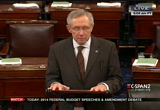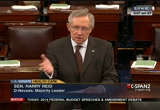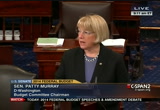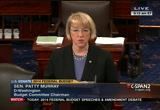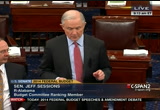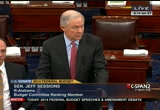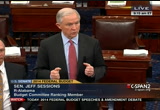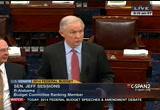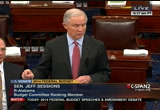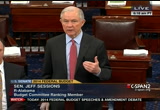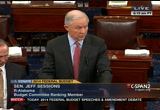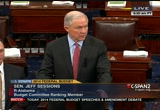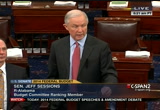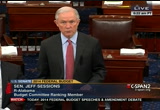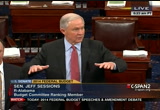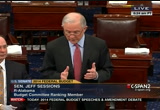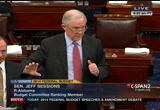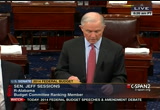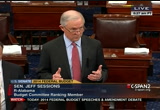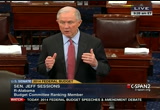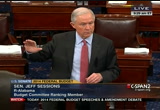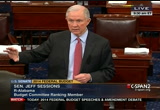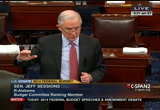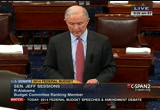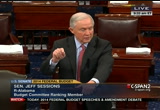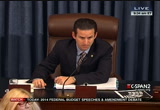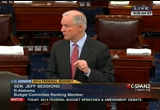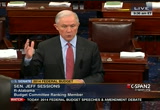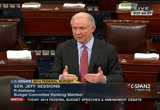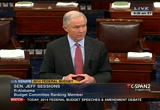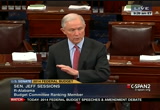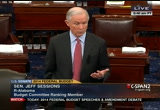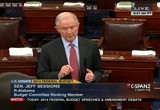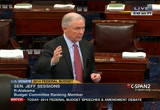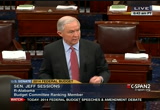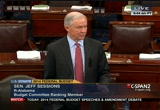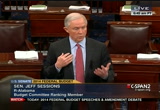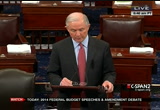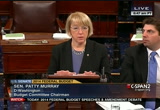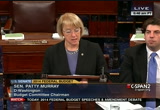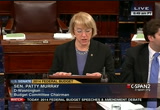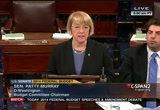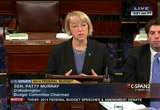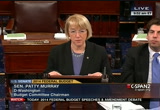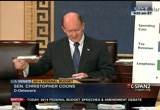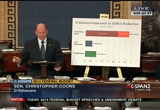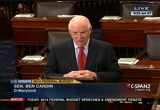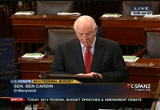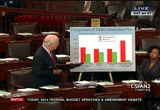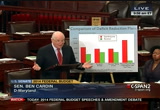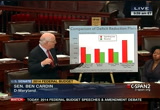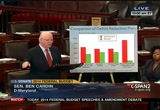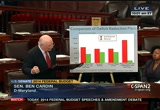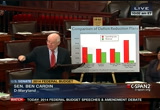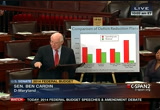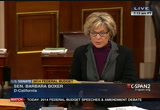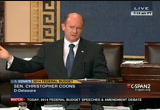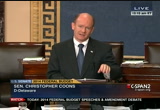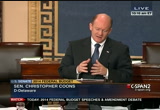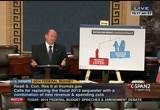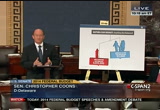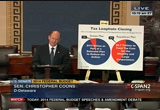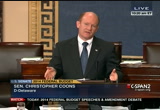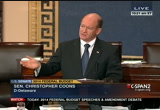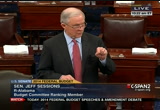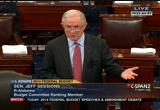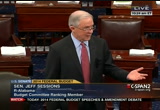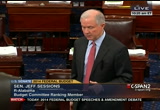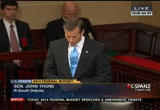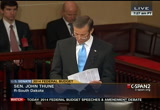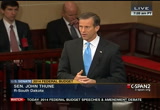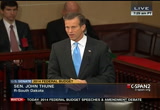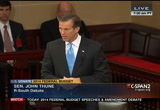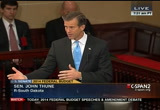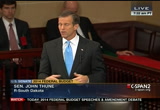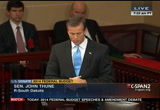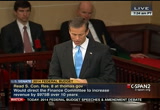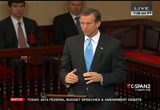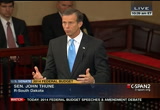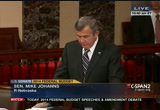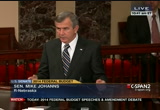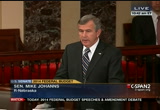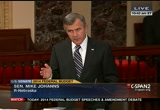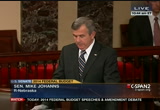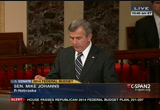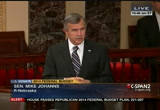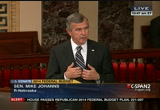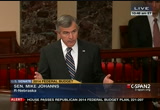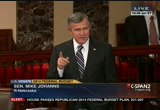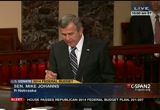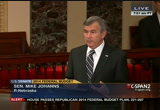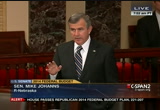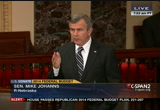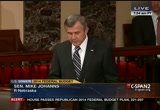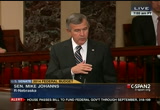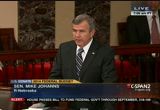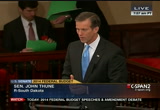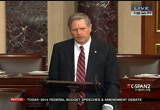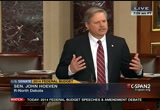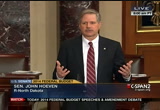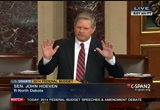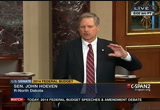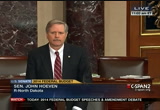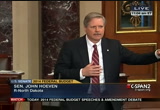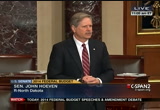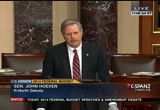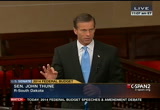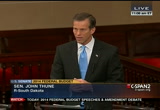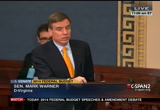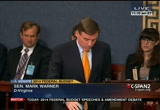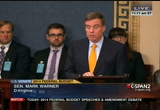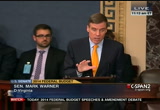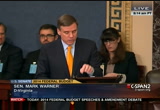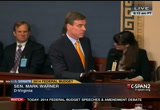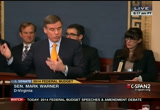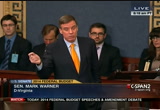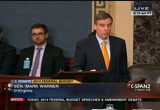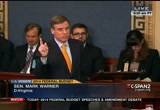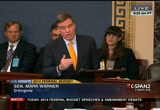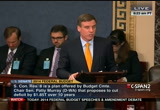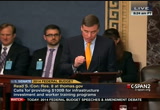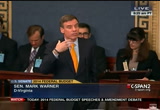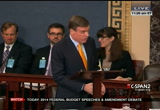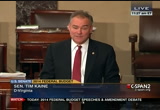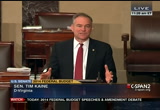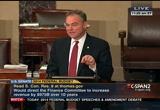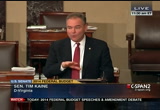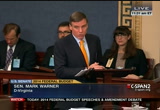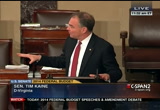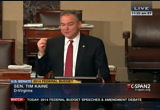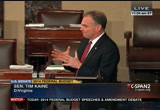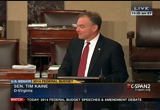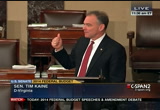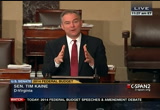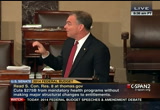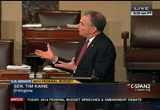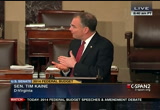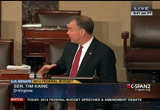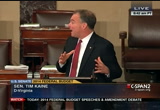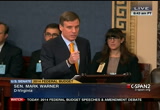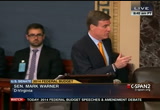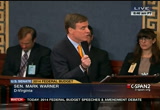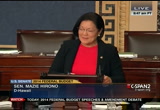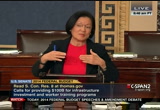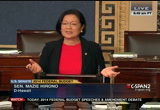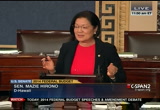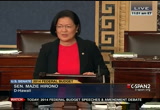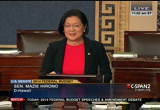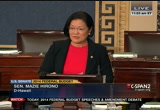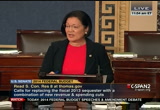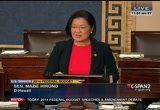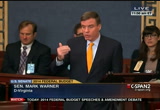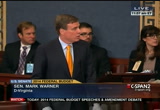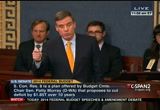tv U.S. Senate CSPAN March 21, 2013 9:00am-12:00pm EDT
9:00 am
today. majority leader harry reid has not ruled out weekend sessions to finish up work on the budget before releasing members for the two week spring recess. now to live coverage of the senate here on c-span2. the presiding officer: the senate will come to order. the chaplain dr. barry black will lead the senate in prayer. the chaplain: let us pray. lord of all being, energize our senators today with your presence. out of your infinite wisdom, speak to their finite hearts and guide them on right paths. out of your marvelous grace, minister to their common needs.
9:01 am
inspire them to cherish the ethical road that leads to a destination that honors you. remind them that they may make plans, but your purposes will prevail. enable them to sense your guidance as they grapple with the problems of our time. we pray in your great name. amen. the presiding officer: please join me in reciting the pledge of allegiance to the flag. i pledge allegiance to the flag of the united states of america, and to the republic for which it stands, one nation under god, indivisible, with liberty and justice for all.
9:02 am
the presiding officer: the clerk will read a communication to the senate. the clerk: washington, d.c., march 21, 2013. to the senate: under the provisions of rule 1, paragraph 3, of the standing rules of the senate, i hereby appoint the honorable brian schatz, a senator from the state of hawaii , to perform the duties of the chair. signed: patrick j. leahy, president pro tempore. mr. reid: mr. president, would the chair report the business of the day? the presiding officer: under the previous order, the leadership time is reserved. under the previous order, the senate will resume consideration of s. res. 8 which the clerk will report. the clerk: calendar number 28, senate concurrent resolution 8, setting forth the congressional budget for the united states government for fiscal year 2014, and so forth. mr. reid: mr. president? the presiding officer: the majority leader. mr. reid: as we just heard, the senate has resumed consideration of the budget debate. s. res. 8, the budget
9:03 am
resolution. we'll continue debate during today's session. senators will be notified when votes are scheduled, of course. now, mr. president, the budget has 34 hours left and then following that we're going to have some votes. it's up to the two leaders, the managers of this bill, whether they have votes before the 34 hours expire. now, mr. president, the these are two experienced senators and they can handle this -- they both know how to handle this budget, but it would seem to me that we should move as quickly as we could to debating these issues. i hope senators come and offer their opinions as to the budget that chairman murray has brought to the senate floor. maybe some people want to talk about what passed the house yesterday, the ryan republican budget. but everyone should understand
9:04 am
that this time will run out at the latest tomorrow at 7:00 at night, at the latest. it would seem to me that the two managers could work toward reducing that time somewhat, but if they don't, it doesn't matter. we are going to be here until we finish this budget. if we're in all night friday, we'll be in all night friday. i have spoken to senator murray. she was willing to be in all night last night, she is willing to be in all night tonight, she is willing to be in all night friday night until we finish this. so we're going to move forward and finish this budget. we are now on another subject, mr. president. three years ago, this coming saturday was a historic time in this country and in the world, actually, because the affordable care act passed. it was a cold winter night when it passed, very, very cold. it was the greatest single step
9:05 am
in generations to help the american people. now, this was unique because for the first time going back to the days of harry truman where he talked about the health care bill for the country to eisenhower who talked about a health care bill for this country, we were finally able to accomplish it. ensuring access to quality, affordable health care for every american, obamacare, the affordable care act. millions and millions of americans as we speak are benefiting from this legislation insurance companies can no longer arbitrarily place lifetime caps on insurance policies during someone's care they suddenly say it's gone, sorry you have cancer or sorry you had that bad accident, but you have reached $1,000 or whatever limit they set, $10,000 and you're through. go get help someplace else because the insurance is over.
9:06 am
that arbitrary lifetime cap that insurance companies had put americans just a car accident away or an illness away from doom. today children can no longer be denied insurance because they have been born with a disease, disability or some other problem. they no longer are denied insurance. and soon, being a woman, being a woman like my daughter is no longer a preexisting medical condition. before obamacare passed, everyone understand that my daughter lana had a preexisting condition. she was born a woman, a girl. that's gone. in less than a year, about 130 million americans with preexisting conditions such as high bloop, diabetes can rest assured that they will have access to affordable insurance
9:07 am
and life-saving care, regardless of their health and how much money they make. in nevada alone, a sparsely populated state of some three million people, tens of thousands of seniors have saved tens of millions of dollars because we three years ago filled the doughnut hole. what that means is they don't have to pay exorbitant prices for their drugs, prescription drug coverage. but health care is not only saving money. it saves lives. there in nevada there are thousands of examples. let me just give you one. a 25-year-old woman named sara coffey, native of garnerville, nevada. garnerville is a beautiful place, right next to the sierra nevada mountains. well, this young lady was very smart. still is, but she was halfway through her first year of law
9:08 am
school at the university of connecticut when she was diagnosed with stage four hodgkin's disease. not one, two or three but the worst, stage four. she had done everything right. she knew she needed insurance so she went to the university of connecticut and bought the best plan she could for students. so that she would have health insurance. but her cancer and the difficult treatment to fight it, she had to drop out of school. she had no insurance because insurance would not cover her. she was, as i said, no longer a student. she was no longer qualified for student health insurance. what was she to do? she needed a bone marrow transplant. her family, she thought there was a very strong possibility she would pass away, die. before obamacare, sara would have been one of tens of millions of americans who
9:09 am
desperately need life-saving care but didn't have insurance to take care of it. before obamacare, sara might even have become one of the 45,000 americans who died each year because they lack health insurance. but thanks to the affordable care act, obamacare, sara was able to sign on to her parents' insurance policy. sara is one of 3.1 million young people in america, 35,000 approximately in nevada, who have benefited from a provisional law that allows children to stay on their parents' health plans until they are 26 years old. sara's story has a happy ending. as happens so often in america when you can get health care. she got the treatment she needed. the most recent pet scan was clear. she plans to return to school this coming september, finish law school. her mother, sue, sent me a
9:10 am
letter. she wrote that obamacare and the dedicated doctors that took care of her doctor saved her life. there are so many with the landmark legislation. here are a few. no american will end up in an emergency room because of no insurance. no american will live in fear of losing his or her insurance because they don't have a job. and then the richest nation in the world, no insurance company will ever again put a price tag on human life. long, long ago, thomas jefferson wrote, and i quote, the care of human life and happiness is the first and only object of good government, close quote. i'm gratified that the affordable care act, obamacare, meets thomas jefferson's standard. i'm so happy that this law came into being. we will all participate in that, remember that cold winter period
9:11 am
where we were in session longer, i'm told, than any other time in the history of the country to pass this legislation. we worked hard to pass it. it's already ensuring the care of human life remains the first object of government, as thomas jefferson said it should. the presiding officer: the senator from washington. mrs. murray: thank you, mr. president. i want to thank my ranking member, senator sessions. we had a good debate last night. i think everyone had a chance to see the differences about the values and priorities that drive us, how we see this country and how we see our future, and i am looking forward to having that conversation again today. mr. president, the budget we are debating on the floor this week puts our middle-class families first. it reflects our pro-growth, pro-medical middle class agenda that the american people went to the polls of in support of in the election just a few months ago. it takes the kind of truly balanced approach that families
9:12 am
across our country strongly support, and i believe it is a strong and responsible vision for building a foundation for growth and restoring the promise of american opportunity. now, i spoke at length last night about our budget. it's built on three principles. number one, we have got to protect our fragile economic recovery, create jobs and invest in our long-term growth. this is something that every family in america is asking us to focus on. number two, we need to tackle our deficit and debt fairly and responsibly. as democrats, we understand that is a responsibility that we bear today and we do it in this budget. and number three, we need to keep the promises we made as a nation to our seniors and our families and our communities. many who have struggled so much over the last few years and are counting on us to be there for them again now. mr. president, we'll be hearing a lot more about all these principles today and we're going to discuss the stark contrast between the budget that is
9:13 am
expected to move in the house of representatives today and the plan and path forward that we have put forward here in the senate as democrats. mr. president, i will yield to senator sessions for his opening remarks, and we will continue this debate throughout the day. mr. sessions: mr. president? the presiding officer: the senator from alabama. mr. sessions: i thank the chair and would express my appreciation to senator murray for her leadership and who are courtesy and her skill in managing the bill through the committee and onto the floor. she is an experienced legislator who has strong convictions but is easy to work with and courteous and effective in what she does every day, so thank you, senator murray. i have enjoyed working with you. well, our chair says that this is a pro-growth, pro-middle-class budget. i say it's pro-tax, pro-spend, pro-debt budget. it's a budget of deep
9:14 am
disappointment. it's a budget that comes nowhere near doing the things necessary to put america on a sound path. it's a budget that does indeed reflect the stark differences between our parties. it's rather remarkable to me the extent to which our majority party in the united states senate has no interest in producing a budget that actually balances and actually puts america on the right path. they say they care about growth, and i know they do. i know they would like to see the economy grow more and more jobs be created because we have had the slowest recovery during this recession since any time after the world war ii, at least. very, very slow. but we have done something to a degree we have never done before, and that is borrow and spend to stimulate the economy. and someone has compared
9:15 am
borrowing and spending to stimulate the economy to the idea of someone taking a bucket, scooping up water in one end of the swimming pool and pouring it into the other. you have got no net gain. the truth is you lose some of the water out of the bucket as you walk along the shore. in this case what we lose is, we lose interest on that debt indefinitely because there's no plan to pay down the debt. so this budget that's before us today does not balance, it does not put us on a sound path, it does not create confidence in the -- among the american citizens that the future is going to be sound, that we've gotten this country reoriented in a way that's going to produce long-term growth. indeed, it's going to do exactly the opposite. it's going to do exactly the opposite. it's going to once again say this senate is not willing to do the things necessary to put
9:16 am
america on a sound course. and it's not that hard. we can do this. it's within our grasp. but our leadership in this senate, contrary to the house, is not willing to take those good, solid, but achievable steps necessary to put this country on a sound path. i just feel that very deeply, and hopefully in the context of our debate and a budget being moved through here on a party-line vote, i suppose, as it was in committee, that maybe some connection will be made amongst ourselves and our members and our brains about the real issues facing the country and what we need to do to get on a right path. and maybe even in conference, if not here on the floor, we can have some miraculous
9:17 am
agreement that would create the kind of long-term confidence that business people and the american people are looking for with -- from the united states congress and the government. mr. president, senator reid indicated we'd like to finish. i'd like to finish, too. we were under the impression we could have started this voting process on the budget as early as monday, if not tuesday. that could have happened. apparently the leadership decided to block amendments, and created on this side a number of senators who felt very strongly that they, in fact, had relevant amendments and they wanted them voting on and they would not agree to time limits until the majority agreed to give them a vote. and whether i was for or against the amendments is not relevant.
9:18 am
i thought they should have been given a vote. they're united states senators. a big bill moving forward cobbled together, several appropriations bills, going to fund the government, and we only have four or five amendments? and serious amendments like senator moran with 28 cosponsors, republicans and democrats, were blocked, couldn't get an amendment. on a relevant issue involving the health and safety of america. so that has put us behind in the schedule. not anything we've done. not a problem on this side. if they had been given amendments, they would have been done in very short order and could have been completed monday or early tuesday. so here we are, we have under the law 50 hours of debate on the budget, 25 to a side, and
9:19 am
unlimited number of amendments can be offered. so that's going to take time, as it always did, and i'm sorry that it's getting punched into the weekend. i'd also just say briefly that as time has gone by, i have been more and more convinced of what i believed from the beginning, and that is that this congress is not capable of producing a massive overhaul of the federal health care program. and i remember the night that senator reid refers to when the final passage, i guess, occurred, or the day that it occurred, but what i remember most as being here christmas eve, my birthday, when the bill cleared the senate on a straight party-line vote, 60-40
9:20 am
with senator scott brown of massachusetts having been elected on a promise to block and kill the legislation, the american people consistently opposing the legislation, and they were able to ram it through before he could take office and cast the deciding vote. they got the absolute minimum number of votes, 60, to pass this monstrosity. i'm told now the regulations in the bill are six feet high when stacked up. we still have -- haven't seen them. and that legislation was 1,700 references to this section to be effectuated by regulations to be issued by the department. and regulations continue to be pouring out in record numbers, to try to clarify the hundreds, thousands of ambiguities in the bill. people's health insurance, we were told, would go down. that this was going to bend the cost curve to bring health care
9:21 am
costs down. we warned that would not happen. who was correct three years ago? health care costs are surging. they're not through surging yet. we're going to have more increases as the health care bill takes effect in january of next year. the average person's premium has already gone up $2,000 plus a year. small businesses are telling us all over america they are not hiring because of the health care bill. this is -- has clearly been a deficit -- a detriment to job creation. we had no ability to write this health care law. we didn't know enough about it. as speaker nancy pelosi said, well, you know, we have to write it to see what's in it. what she meant was, we're just going to pass some vision of health care reform and the bureaucrats will take care of it. well, they're not taking care of it well. we're not capable of managing
9:22 am
it. we are endangering the greatest health care system the world has ever known. we're going to see fewer and fewer top-quality young people go into medicine. i'm hearing that over and over again. doctors are telling me they don't know what to tell their children about going into medicine. this is just one example of what happens in this country when people in washington take on the arrogant view that they know how to fix the health care system. one of the most massive, complex, marvelous systems the world has ever known. you can go in alabama and see some of the best doctors in the entire world in our state. people come there from all over the world. dr. andrews, treated r.g. iv, private practice in birmingham. you can go to top quality surgeons in mobile, montgomery, throughout the
9:23 am
state, tuscaloosa, huntsville. this is true in every state in america. and for people to say our health care is not the best in the world, why do people come here from all over the world? that is one of the most horrible things i've ever heard, really, around here, suggesting. so we've got people that die sooner than some other countries. well, we have a lot of things. we have more obesity, more smoking, less people taking care of themselves sometimes. we have a lot of individual problems. we have a higher murder rate. we have accident rates on automobiles. so we have things that pull down our life -- that doesn't mean our health care isn't good. doesn't mean our health care is not the best in the world. all of us have seen that. so chairman murray, where are
9:24 am
we now on going through the business of the day? i appreciate your leadership and sutionz as to what -- suggestions as would to what we should do now. the presiding officer: the senator from washington. mrs. murray: i ask unanimous consent the following staff on the finance committee have floor privileges for the 113th congress, rene desai and ivy dong. the presiding officer: without objection, so ordered. mrs. murray: i'm happy to get things going here today. does -- does the manage on the other side have an amendment that he wants to start with? mr. sessions: i would like to start with a motion, yes. i would be prepared to do that. i thank the chair. i would offer a motion to recommit this budget that's on the floor today to the committee with instructions that it be altered to produce a balanced
9:25 am
budget. that's what i think this nation needs. i think that is what the american people want, and that's what we are determined to fight for because it's the right thing for the country. not because there's some green eyeshade goal. i've heard that argument. that is not what's on our minds when we say let's balance the budget. it's not what the american people have on their minds when they say why don't you guys balance our budget? what is it that's necessary here? we believe that if we alter our debt course in a responsible way and we begin to reduce the deficits regularly and steadily and in an effective way, we can reach a balanced budget and we can keep on that balanced budget without cutting expenditures, the facts are quite clear, we could increase spending every
9:26 am
year, just not as much as we're increasing spending today and not as much as our democratic budget increases spending. that's what we believe we should do and i'll explain as we go forward how that can create jobs, create growth growth, will make this country healthier, will create confidence in the world financial community, we'll see more money come to the united states, will allow businesses sitting on cash to begin to invest and hire people. that's the direction we should be going. that's what would be good for america. but first and foremost, as i explained last night, our democratic budget that's on the floor today comes nowhere close to that. it is nowhere close to setting forth a plan that would actually balance the budget. indeed, the budget never balances under their plan. and it won't balance in the future. things are going to only get
9:27 am
worse. they're going to get worse because they deal in no way with the fundamental driving forces of the debt this country faces. they don't deal with that. and if you don't deal with those issues, then you're not going to get the debt under control. but we can do it. we can do it in a number of ways. now, the president has sent his message very clear. recently on abc with george stephanopoulos he said and so, you know, my goal is not to chase a balanced budget, just for the sake of balance. well, who said we're trying to chase a balanced budget just for the sake of balance? that's not what we're doing. we're trying to put america on a sound debt path. we're trying to put america on a sound financial path that will create confidence and avoid the
9:28 am
danger of a fiscal crisis. well, my colleagues, we started counting last night, and my colleagues yesterday and last night, i think we stopped counting, used the phrase "balanced" 24 times. this is a balanced approach, it's a balanced plan, we got seeking primary balance, we're going to have a responsible balanced plan, pretty soon they're saying they've got a balanced budget. well, they don't have a balanced budget. we need to understand that fully. secondly, the budget that's been produced here does not even put us any closer to a balanced budget than we are today. when you add up the taxes that are being increased, when you add the new spending that's in this bill, it doesn't change
9:29 am
the debt course at all. earlier this year, mr. elmendorf, the director of the office of the congressional budget office, testified before our budget committee. and mr. elmendorf is an excellent scholar and a man who has managed the money of the budget well, and mr. elmendorf is -- mr. president, i'm having a little trouble concentrating with the roar going on in my background. the presiding officer: the senate will be in order. mr. sessions: like to keep it down a little bit. so mr. elmendorf told us at the budget committee that we are on an unsustainable path. okay. this is after the budget control act, after we reduced the growth of spending $2.1 trillion, and that includes the sequester, after we did all that, this year he told us we are on an unsustainable debt course.
9:30 am
that this is a danger to america and you have to get off it and we need to make further changes to get on the right course. so we've looked at this budget, and we thought that the committee, who called him, listened to him, and we wanted to see if that budget that's on the floor actually helps us get toward a sound financial future. and i have to say it does not. it does not change the course we are on. it raises taxes dramatically, but it raises spending, and eats up all the new taxes, not altering the amount of debt that will be raised over ten years. isn't that a failed budget plan? isn't that a failure of leadership? i hate to say that, but the challenge of our time is to deal with our financial crisis. the challenge of our time is
9:31 am
alter the debt course we're on and put us on a sound path. and it's not been met by this budget. the house budget, we all may have different ideas about some of the things in it. it provides for increased spending every single year, but it balances the budget, totally balances the budget in ten years. so it would balance in ten years. and does it by increasing spending every year on average of 3.4% a year. so we can increase spending at 3.4% a year, increase spending and balance the budget. but the problem is the budget the majority sends forth would increase spending at 5.4% a
9:32 am
year. that doesn't sound like a lot, but the difference is trillions of dollars. the difference is a plan that puts us on a sound financial path to the future and a plan that leads us on the unsustainable debt course we are now on. my democratic colleagues need to look at this. we saw i guess in "politico" -- i had the quote here yesterday -- that said fundamentally the majority's plan was written by the left of a democratic conference. left, and it said explicitly to the left of president obama. well, that makes sense if you look at what's in the budget. look how much they spend, how much they tax and how they don't save -- they don't reduce the debt that we're adding every single year. so that's what we've got. and so as the chairman murray said, budgets present a contrast. budgets lay out your vision for
9:33 am
the future. a budget defines who you are because it says how much you want to tax in the next ten years, it says how much you want to spend in the next ten years, and it requires you to say how much debt you're going to accumulate for america over the next ten years. this plan will add another $7.3 trillion to the debt of america. we are already at almost $17 trillion. that will take us to about $24 trillion in ten years. interest on that debt is huge. by their own numbers, interest on their debt would amount to approximately $800 billion in one year. interest on the debt under their budget would rise to the point of $800 billion in one year. we spend about $100 billion on education. we spend about $40 billion-plus,
9:34 am
a little over, on highways, roads and bridges. that's just an example. we are now surging from 200, 250 in interest to 800 in interest as a result of the accounting that c.b.o. has provided us if we follow this path. it's going to crowd out spending for research. it's going to crowd out spending for children, education, health care and any other program this government wishes to undertake, including defense. mr. president, what kind of time limit might i inquire? is it 30 minutes on this side on this motion? the presiding officer: on the motion, there is one hour equally divided. would the senator like to call up his motion? mr. sessions: my first question would be how much time is left on my half of that hour? the presiding officer: the motion has not yet been called.
9:35 am
mr. sessions: well, i would call up the motion, mr. president. the presiding officer: the clerk will report the motion. the clerk: the senator from alabama, mr. sessions, moves to recommit senate concurrent resolution 8 back to the committee on budget with instructions to report back no later than march 22, 2013, with such changes as may be necessary to achieve unified budget balance by fiscal year 2023. mr. sessions: so this motion would simply say this to our colleagues, and it will be a defining vote for our members, and members need to understand the meaning of this vote. the question will be do you favor a balanced budget? is it important to you? have you said i'm going to vote for a balanced budget amendment? have you said i -- in your town hall meetings and in your campaigns and in your debates i believe in a balanced budget amendment or i believe in a balanced budget, period?
9:36 am
what we're saying is that this country can balance its budget. we can balance a budget in america today if we set forth a plan that allows the spending levels to increase by 3.4% a year for the next ten years. isn't that great news? we can spend 3.4% more each year, according to the data the congressional budget office gives us and that we rely on, we can do that and still increase spending over the next decade. inflation is going to increase about 2%, a little over, according to c.b.o. it will increase about 45% over the next ten years -- excuse me. 25% inflation and about 40% if you increase spending each year at 3.4%. that puts us on a path to balance, and it begins to reduce the debt overhang for our country.
9:37 am
it brings down the amount of debt that we have in our country and puts us on a sound path. it does all the things we need. it sends a message to the world that we have got our financial house in order. and i believe good members of this body, democrats and republicans alike, have told their constituents and are sincerely of the belief that we can and should balance our budget, and when i mean balance, i mean honest balance. not some balanced approach, not some primary balance, none of that. that when the revenue comes in and the money goes out, it's the same. we're not sending more money out than we're bringing in in revenue, having to borrow the difference and pay interest on it, because that's what we have been doing to a degree that we have never, ever done before in this country. we have never, ever done before what we're doing now.
9:38 am
we have never, ever had four consecutive years of trillion-dollar deficits, nothing close to it. people said president bush was irresponsible. he should have been more wary of the grand promises that the economy would never have a recession and that things are going to go great. he should have. the next to the last year when he was in office, the budget deficit was $167 billion. it had dropped from a higher figure in his time in office. his last year was $450 billion or $460 billion. president obama has been in office four full years, starting his fifth, and his deficits have been averaging 1,200,000,000,000 dollars a year. we have never, ever seen anything like this before. it has surged the united states
9:39 am
of america and our democratic colleagues don't have a plan that will put us on a sustainable path in the future. if we come back out of the economy, we restrain the spending growth just a little bit, we can balance the budget. that's what we ought to do. and again, a goal of balancing the budget is not just some frivolous goal for political reasons. the goal of a balanced budget is that we would put us on a sound financial course. it will mean we have confronted the challenges of our time. it means that we know that we can't continue to spend systemically more than we bring in, that our debt crisis could occur and we could have a decline in wealth in america. so when we say we want to recommit to the committee, colleagues, you need to know what this means, and it simply means this -- we're directing the committee, the majority of which are democrats, and they
9:40 am
can write the budget as they choose, using whatever tax changes they want to make and whatever spending changes they want to make, but the budget that hits this floor would be a budget that balances, that creates growth, confidence and prosperity for america. that's what we are asking you to cast a vote for. and i believe you should break ranks on this. i believe you should vote your conscience. i believe every senator should vote the beliefs of their constituents. poll after poll after poll show that the american people prefer a balanced budget. they know you can't continue to do what we are doing. i think it's got potential, and we're willing to work with the majority. we may disagree with the results, but my goodness, wouldn't it be great if the senate produced a budget that balances and it had one vision of how to balance the budget, the house produced a budget that
9:41 am
balances and they have got their vision about how to balance a budget and we go to conference and we could actually reach some sort of a compromise that would fix the financial future of america? the whole world would be amazed. they would say my goodness, the united states, look at this, they have gotten themselves together. we thought they were going goofy. we thought they had completely sold out to spending and borrowing. and look at this. there would be more investment. american businesses would feel better. american workers would feel better. we would begin to have more growth. that way. so that's the way we believe jobs and growth are best created. not by the sugar high that comes from borrowing and spending money. now, back when we did the stimulus bill -- i'd like to
9:42 am
share this with my colleagues because the very important concept explained to us by mr. mr. elmendorf, the c.b.o. director, when we passed the stimulus package that was going to reduce the unemployment rate dramatically, put the country on a sound path, stimulate the economy, how are we going to do it? we're going to borrow money, every penny of the $830 billion, now $1 trillion with interest, $830 billion was borrowed and we spent it. and this is what the director of the congressional budget office said about that. he said yes, it will create growth in the short term, it will enhance the growth in the short term. one financial expert called it a sugar high. you will get that. but once that's over and you have got the burden of the debt, it begins to cost you every year, and it will cost you as long as that money has been spent, as long as you pay
9:43 am
interest on that money. now, we're going to pay interest, young people, american people indefinitely because we have no plan to pay this debt down that we have accumulated. we'll be paying interest on that indefinitely. and this is what c.b.o. said back then, 2009, when the stimulus bill was passed. they said yes, you get a short-term benefit, but over ten years, over ten years, c.b.o. said over ten years you will have less net growth than if you did not have the stimulus package at all. think about that. so we took the sugar high. we voted to borrow the money. i didn't. i opposed it. but it passed to borrow more money to spend now to try to create a sugar high, pull yourself up by your bootstraps, pull one bucket of water from the pool to another, and this is going to somehow permanently fix
9:44 am
our economy. well, there were some things i think that would have been legitimate for us to do at that time, and i supported a more restrained package that had more infrastructure actual benefits and some other things in it, but fundamentally we are not now -- we are almost now at the point where the benefits of that spending have been gone and the detriment, the drag is already here. multiply that. multiply that by the fact that we now have a total of $17 trillion borrowed from around the world, and we are paying interest on that every day but we are paying it extraordinarily -- we are paying extraordinarily low interest rates. we really are, unlike any we've seen in the history of the world, i suppose. and those -- those low interest rates are not expected to remain. and so that's why they project
9:45 am
that we're going to have interest rates under this budget such that we will be paying on the 20-some-odd trillion, $24 trillion debt that we would have by 2022, $800 billion a year in interest, which would be more than the defense department, more than what we pay on social security today, more than what we pay on medicare today. that's a huge, huge thing. i would just say, mr. president, we want growth. we want prosperity. we want to unleash the natural, hirnt entrepreneurial -- inherent entrepreneurial power of the american spirit and economy and culture. it's a wonderful, wonderful thing that we have. and our free-market infrastructure is magnificent. but it's being handicapped by poor economic financial policies of this country, and we need to
9:46 am
get off this path. we need to get on a path to a balanced budget. so madam chair, i thank you for the opportunity to make this motion. i hope that you would consider it. i would provide you and the committee with full freedom to produce a balanced budget any way that you choose through any mix of tax and spend policies that would be chosen by the committee, and it would then come back to the floor and if we were to vote for it, i think then it would go to conference and put us in an extraordinarily better position to achieve a bipartisan agreement this year that could help pull us out of the economic doldrums, put us on a path to economic prosperity, to eliminate the debt drag that international stud yiz -- studies, i.m.f., central bank, bank of international settlements and the professors rogoff and
9:47 am
reinhart have shown pull down debt. a what they're saying our debt is so high, it's lowering economic growth right now. right now it's lowering growth. we would change all of that through a balanced budget coming out of committee. it would put us on the right path without having to reduce spending actually. we could increase spending every single year. so, mr. president, i make that motion and i would yield to the chair. the presiding officer: the senator from washington. mrs. murray: i'd like to use the time in opposition to the resolution. the presiding officer: the senator is recognized. mrs. murray: our colleagues have send a motion that sends our budget back to committee to balance. we know what that means. they want to send the budget back, take months, weeks, to put together a budget that does one of two things in order to balance. either raises an incredible amount of revenue or it cuts --
9:48 am
has devastating cuts in it. we've seen the package they're talking about. it's the ryan budget being debated in the house right now. they say that -- say that they would eliminate the deficit in 2023. the republicans not have put that budget out here right now because they don't want to specify what those cuts are and be responsible for them. they just want to mystical moment to happen back in committee where these tough decisions are made. we know what they're looking looking at. they're looking at the ryan budget that eliminates the deficit, they say, but it does in a devastating way to middle-class families across this country, families that are already struggling so much. you know, we hear a lot about balance these days and i want to clarify some real differences, important differences between how the senate and the house budget uses the word "balance." the proposal that passed through the budget committee in the house would be devastating for
9:49 am
our economic recovery, it would really threaten hundreds of thousands of jobs this year alone. it takes extreme cuts to our infrastructure that's crumbling, to education that's so important to our future, to innovation, that this country has been built on, that would lay down a strong foundation for broad economic growth which our senate budget is working so hard to make happen. their budget in the house that the republicans now want us to go back to committee and put in place, would dismantle medicare and cut off programs that support our middle class and most vulnerable families. that sounds pretty unbalanced to me, mr. president. and, frankly, their budget gets worse. as we learned last week, house republicans have put forth a budget that calls for huge tax cuts for the wealthiest americans and makes it unclear how it's going to be paid for. well, those paid-fors will come on the backs of families who are
9:50 am
working really hard today, just average families who would see their taxes increase in order to give that tax cut to the wealthy americans. that's what they call balance. mr. president, i don't think that's balance. house republicans like to say they're offering a balanced budget, which i would like to note also includes savings from the affordable care act that they have vowed to repeal, tax increases on the wealthiest that they strongly oppose, and they haven't really explained how they're going to reach that goal of reducing those rates down to 25% and who's going to pay for that but it's pretty clear when you look at the numbers how that's going to happen. so the house republicans never really explain how they get to what they call balance, because the only way they can do it is either by raising taxes on the middle class or making deep cuts to vulnerable families and seniors that they depend on. mr. president, our budget takes a very different approach to balance. we make sure that our families
9:51 am
today have the ability to get what they need to put their families back on a stable path to recovery today. we make sure that we invest in the important things this country needs to make sure that our middle class has what they need in education, in infrastructure, the things that allow families to know that their kids can go to college, that they can pay their mortgage, that they can get job training and get back to work. that's balance, mr. president. when we have a responsible approach to spending cuts and to revenue. balance is an important word. balance is about making sure that we do what the simpson-bowles report has recommended, what every bipartisan group has said and have a responsible mix of revenues and spending cuts. so that no one bears the burden of the challenges of this country alone. i would not call the house republican bill balanced. their balance says that the wealthiest americans, the
9:52 am
biggest corporations don't contribute to this problem at all, everything is done on the backs of our middle-class families. so, mr. president, yes, balance is an important word. it's an important word to every family, every community, every american. the approach we take is balanced, making sure that everyone has an opportunity in this country for the future that we need, making sure that everybody participates in solving the problems in front of us. i take a back seat to no one, mr. president, when it comes to making sure that we have a balanced approach. our budget does that. we're going to be hearing more right now we have a number of colleagues who are on the floor, but let me make this very clear -- the motion to recommit the senators on the other side have offered we're going to go back to the committee until we get the ryan bill in front of us. mr. president, that is something we soundly reject. mr. president, i have a number of colleagues here who are going to participate. i will yield to the senator from delaware and thank him for his great contributions on our
9:53 am
committee this year. mr. president, i will yield the time from off the resolution. the presiding officer: the senator from delaware. mr. coons: i ask unanimous consent to enter into a colloquy for up to 30 minutes with senators from california, new york, illinois, and maryland. the presiding officer: without objection, so ordered. mr. coons: mr. president, at its heart, a budget is a statement of values and last week i joined with my colleagues on the budget committee to pass a budget resolution firmly rooted in our values. and thanks to the leadership of chairman patty murray, the budget we passed reduces our deficit and stabilizes our debt in a balanced, responsible way relying on an equal mix of spending cuts and cuts to spending through the tax code, a balance of cuts and increased revenue through tax reform. this first chart briefly shows that we've already made significant progress towards the simpson-bowles goal of $4
9:54 am
trillion in reduced federal spending over the next ten years, and our budget relies on these two next pieces, reducing loopholes, tax expenditures, and spending cuts. this is the balance that i believe the american people called for in the last election. our budget promotes economic growth and job creation in the short term, makes critical investments in our competitiveness for the long term, and does all this while putting a circle of protection around the most vulnerable in our society, children, low-income seniors, and the disabled. unfortunately, in my view, the budget resolution passed by the house budget committee led by chairman ryan does not reflect these same values or this same balance. it is wildly unbalanced, relying only on spending cuts in order to achieve claims of enormous savings. yet when you look closer, and we'll turn to this more detail later in this colloquy, the ryan budget actually relies on a whole series of deceptive gimmicks, impossible arithmetic
9:55 am
and unrealistic assumptions. the only will be way to make itp is to increase our deficit or raise taxes on the middle class by as much as $3,000 a year. so in my view, the house republican budget either fails the test of deficit reduction or fails the test of basic fairness. it also i believe fails the test of economic growth and would put us on a fast track to austerity. let me turn to my colleague from the state of i had maryland to ask for his comments on the contrast between the budget we've offered in the senate and the budget adopted in the house. mr. cardin: let me thank my friend, senator coons. you're exactly right as you talk about the balance and senator murray, you're absolutely right about the balance that we have and the budget that's come out of the budget committee. you know, yesterday we did something that was the right thing to do, we passed a constitution, an omnibus appropriation bill. the good news is we worked together, we got that done, it's a major improvement from what the house did and the house, again, was acting in a
9:56 am
very partisan, one-way direction that would have caused additional harm. i was disappointed that the bill we passed yesterday was at the sequestration levels. i'm against sequestration. i think we should substitute it for strategic reductions in the deficit. that's exactly what the budget that's coming out of the budget committee will do. it will substitute for sequestration, a strategic way to get our budget do into better balance. that's what we need to do. the budget, as senator coons, have pointed out, is our blueprint, it's a framework. and all the elements that are necessary for a responsible budget is included in the budget document that has been brought to the floor. i'm proud to support it. it gives us the right blueprint for america's future. most important thing first is it does get rid of sequestration. and sequestration is across-the-board, mindless cuts that says every priority in this
9:57 am
country is exactly the same. that's not the case. and the budget coming out of the budget committee does a responsible way of substituting for sequestration. senator murray mentioned balance, and i want to talk about, this chart really points out the fact of how balanced the budget really is. the budget -- senate democratic budget balances additional spending cuts, and senator coons, you're absolutely right, and additional cuts in the -- what we do in the tax expenditures. we spend money through the tax code, we spend money through appropriated bills, and the budget that you've brought out balances reductions in both categories. sequestration only applies to the appropriation process. doesn't apply to how we spend money through tax expenditures. it's interesting, this is very similar to the other bipartisan proposals that have been brought forward. we talk frequently about
9:58 am
simpson-bowles. some of us may have disagreed with the expectses but we thought -- specifics, but we thought it was the right blueprint between -- the right balance between expenditures, and the senate democratic proposal is very similar to simpson-bowles on the ratio of cuts. actually it has more spending cuts and is a little bit less revenue. the gang of six, again, very similar. we're proud our colleagues came together with an effort to try to bring democrats and republicans together. the democratic budget in the senate builds on that bipartisan cooperation. very similar. when you look at the house republicans, they are totally out of step with what is necessary in order to get our country back into balance. this provides a framework for investment. i very much appreciate senator murray, the fact you have provided ways we can invest in infrastructure, how we can invest in research and development, how we can invest
9:59 am
in education because that translates to job growth. the more jobs we create, the more taxes are paid, that's how you also balance the budget and the senate democratic budget, the budget coming out of the budget committee, provides for those types of important investments. you also protect the most vulnerable citizens. and that is so important. so important. you protect medicare. why? because it's important for dignity of our seniors. you recognize that in every effort we made -- particularly appreciated the statements that were made, senator durbin was a major player in bringing this out, that going in deficit reduction we want to protect the most vulnerable. we don't want to add to the poverty of america. and the democratic budget that you brought out carries out that commitment, protecting our most vulnerable. you also lived up to the commitments to our veterans, and i appreciate that very much. senator kennedy said as we express our gratitude we must
10:00 am
never forget the highest appreciation is not to utter words but to live by them. we all say we appreciate our soldiers, what they've done for the country, protecting the democracy and freedom of our country. well, this budget does more than just say our appreciation. it acts by deeds, carrying out our commitment to the best health care for our veterans, including mental health services, and i particularly appreciate the reserve 23u7bd that is permitted that makes eligible for more veterans for benefits and improves the efficiency of claims processing which is particularly important in our region where so many veterans have waited way too long to get the benefits they're entitled to. but let me just mention one last point. senator murray, you mentioned it, senator coons, you mentioned it. the main difference here between the budget the democrats have brought out and the republican budget that we have seen in the house is that this is a credible way to manage our deficit, which
10:01 am
is the most important thing. managing our deficit in a credible way that will get our deficit under control, it builds on the deficit reductions we've already done, we have already done since we started this debate and simpson-bowles recommendations came out. we have already done $2.4 trillion in deficit reduction, $1.8 trillion in spending reductions, $600 billion in revenues. this is very similar to how the simpson-bowles proposal was made. you have a plausible baseline. i'm not going to get too technical about all this. you're not using smoke and mirrors. you're using a realistic baseline in order to do the deficit reduction. it's achievable. it's doable. it's credible. and you deal with tax expenditures. one more point about tax expenditures, senator coons, because you're exactly right. we have provisions in the spending programs of this country that invest in energy
10:02 am
security, and that's subject to sequestration because it's an appropriation bill, but we have provisions in the tax code that gives special breaks to the oil and gas industry. these are expenditures. these are revenues that we're hemorrhaging. they should be at least under the same scrutiny as the appropriation bills. and what the budget is saying is that we can get some savings from these tax expenditures, and which we use that for is to get our debt under control. and senator murray, you're absolutely right. one of the huge differences between the democrats and republicans is that the republicans want to reduce the tax breaks for middle-class families to give bigger tax breaks for high-income families. we say we can make the tax code more efficient and have a budget that allows for the growth of the middle class and to manage our debt in a more -- better
10:03 am
way. bottom line, this budget produces $4.25 trillion over the ten-year window compared to simpson-bowles which was $4 trillion. it's even more deficit reduction than the simpson-bowles proposal. it puts us on a sustainable path for a manageable deficit. now what we need to do is negotiate and get this done for this nation, and this framework gives us that ability to do that. what america wants is a balanced approach that allows for growth that is credible. this budget gives us that pathway. and most importantly, it will give predictability to the american economy, which is what i hear more and more as i go around. people want us to make decisions. we're prepared to make decisions. this budget gives us that pathway. and i congratulate senator murray, senator coons, i congratulate you for the work you have done on this. mr. coons: thank you so much, senator cardin. thank you for your leadership on the budget committee and your hard work in this chamber over
10:04 am
many years. i couldn't agree with you more that the budget we're bringing forward to this floor today is one that invests in growing the american economy, that gives us a real path forward towards out-educating, out-innovating, out-building our competitors globally. one that is focused on job creation but also on deficit reduction in a responsible and balanced way. in my view, the ryan republican budget, if adopted, would give us a cure worse than the disease. and to talk about its impact on america's treasured entitlement programs on the promises we have made to our veterans and our seniors, i'm grateful that my friend and colleague, senator boxer of california has joined us. senator? mrs. boxer: senator coons, thank you so much for including me in this -- this opportunity to speak about the choices that we have before us, and i'd ask how much time remains for senator coons so i have an idea. the presiding officer: 18 minutes, senator. mrs. boxer: all right. thank you. well, we all know that a budget is critical because it's not
10:05 am
just a bunch of numbers. it's a statement of who we are as a people, what are our values, what do we think is worth investing in, what do we think we should cut and so on. and it's interesting because we have been attacked, senator murray and the democrats, for backing a budget that the republicans say is not in balance. well, i want to argue the point. i think it is in fact the only budget between this budget and the republican budget and the house which is the one embraced by republicans, it is balanced in many ways. the first way is it's balanced between investments, the things we need to invest in for our nation like innovation, education, invest in our kids, invest in their health, commitments we have made over the years to our senior citizens and i'm going to talk about that in a minute about what the republicans do to medicare in
10:06 am
their budget, and, by the way, they kill it so i'm going to explain how and why. and it also moves toward numerical balance in a way that economists of all size and stripes believe is wise, which is get this down to -- deficit down below 3% of g.d.p. my colleagues don't think that's good enough, although i never heard one word from them, not one word when george w. bush came in and he shredded the budget, he took a surplus that bill clinton and the democrats with some help from some republicans had put in place, they shredded it under george bush by giving tax breaks to the wealthiest, putting two wars on the credit card, a prescription drug plan that didn't allow medicare to negotiate for lower prices, and the deficit went
10:07 am
wild. and it didn't even make sense from an -- i am an old -- i am old. i'm an old economics major, and i remember the basics. you know, you don't go into such deep, deep debt because if there is a recession, you can't really help spend your way out of it, and what happened is when president obama got elected, he faced the worst deficit crisis. that deficit went up to well over a trillion. he's gotten it back to $850 billion. it's still too high, but the fact is i never heard a word from my really good friends on the other side of the aisle. when they were racking up those deficits. oh, this supply-side stuff is going to be great. well, it wasn't great, it wasn't good, and i'm glad that this budget takes us back to the notion in the clinton years which is you have a balanced approach between revenues, investments and commitments to
10:08 am
our people. now, if you look at the republican budget, that ryan budget over there that passed with huge republican support, you see what he does. i'm going to tell the people something they may not know. the ryan budget, the republican budget includes more tax breaks for the people at the top. surprise. i thought we had an election about this. didn't seem to matter to the republicans. a new tax break of $200,000 a year for people making over a million dollars. just what we needed, mr. president. more tax breaks to the people at the top. $200,000. a year, a year. when you think the average income is about $50,000 a year, the republicans are giving $200,000 a year to millionaires. forget it. that's why they want us to send this budget back, to come out with that kind of a budget? no way. i want a balanced budget.
10:09 am
and by the way, how do they pay for this? unspecified closing of tax loopholes. well, let me tell you, mr. president. the amount of money they're putting in these new tax breaks, $5.7 trillion is so high they will have to end the home mortgage deduction, which the middle class really needs. i can tell you, the wealthy people don't need mortgages. they can buy their homes outright. the middle class, the upper middle class, they need this tax break. charitable deductions that our charities count on. making sure you can write off state and local taxes which helps our states and our cities. that's what they're going after. they don't say it because it's unspecified. so i hope i have made a point. the republican budget is basically a sham because i don't know any senator on either side of the aisle that would vote today to do away with the
10:10 am
charitable deduction, the home mortgage deduction, state and local tax deduction. maybe a couple of them would, but i can tell you hearing from my folks at home the charities that depend on that deduction and the real estate people who are finally seeing a little recovery. what a time to do that. so i say that budget is a sham. it doesn't balance, and worse yet it hurts our people. i have only one more point to make and then i will yield back the time to my friend. how much time remains? the presiding officer: 13 minutes. mrs. boxerer: will you tell me when i have used up five minutes, please? thank you. mrs. boxer: so let me now tell you about medicare. in the republican budget, if you were younger than 55, instead of getting the same medicare your parents had and the same
10:11 am
medicare you paid into and the same medicare that you counted on, it's over, folks. it's over. you will get a voucher. there is no more medicare. and they tell you go out with that voucher and find your own insurance. now, we know because studies have shown us that that plan says that you will be paying $6,000 a year more out of your own pocket for health care. that's what this so-called medicare, new medicare program is. it is not medicare. medicare is a guaranteed benefit. you take the card, you go to the doctor. here you take a voucher. now you're 55. supposing -- and then you get older. if you're lucky enough to have health insurance, you get older, and now you're 70 and now you're
10:12 am
80 and you're taking an insufficient voucher, you're retired. this is a giant nightmare. these are supposed to be the golden years. well, the people who lose this will have lost the golden medicare guarantee. i'll tell you that. but here's the final point. the republicans say oh, if you had medicare, don't worry, you're fine. baloney. if you end medicare, destroy it like they do over there, the republicans, the people left in it are part of a dying program, a dying program that is being fazed out. who is going to try to improve the quality of that program? it's going to be like fixing an edsall or fixing your typewriter. there is no more medicare. it's going to be a program that is dying, that is being fazed
10:13 am
out, and that will hurt current senior citizens. so let's be clear. the ryan budget, the republican budget, takes the medicare promise and it shreds it, destroys it and it's the end. when president johnson signed the medicare law in 1965, here is what he said -- no longer will older americans be denied the healing miracle of modern medicine. no longer will illness crush and destroy the savings that they have carefully put away over a lifetime. no longer will young families see their own incomes eaten away because they are carrying out their deep moral obligation to their parents, to their uncles and their aunts. so i am saying to senator murray thank you, thank you, thank you for your leadership. i am saying to democrats like senator coons who has organized this today, thank you for your leadership. thank him for a budget that recognizes our obligations to our seniors, to our veterans, to
10:14 am
our children, to this nation to make sure this is a nation of innovation and -- and thank you for protecting transportation, an issue that i care deeply about as chairman of the environment and public works committee because without being able to move people and move goods, our nation will not be a leading economic power. so i thank you and i yield back to senator coons. mr. coons: i thank my good friend from california and the other members of the budget committee who have worked so hard to pull together this proposal, this package, this budget resolution that comes to the floor today. mr. president, i think this is a great week for the united states congress. we are at loose in stark contrast, presenting to the people of the united states a budget path forward adopted boy the republican-led house and a budget path forward adopted by the democrat-led budget committee, and hopefully not just debated but adopted in this chamber this week. let me briefly summarize the
10:15 am
main points made by my colleagues. first, as the senator from california emphasized, one of the core elements of the ryan budget plan that gives us real pause and concern is that it doesn't keep our promises to our seniors, to our veterans, to our most vulnerable populations. it block grants medicaid. it repeals the health care law's expansion of medicaid. it repeals the health care law's exchange subsidies. and more importantly than anything else, it turns medicare into a voucher program. these are fundamental changes. when chairman murray began our deliberations as a budget committee she laid out three core values she wanted us to keep in mind. that our budget resolution should first have help grow the economy and help the private sector create jobs. and i believe it does that by prioritizing critical investments in infrastructure, in education, and in r&d. second to keep our promises to our veterans, to those in our country to whom we've made commitments over decades.
10:16 am
something i would add that we also continue to respect and embrace, a circle of protection for the most vulnerable in our society. and last, that we make credible progress towards reducing our deficit and debt, but in a sustainable way that allows us to continue to grow our economy from the middle out. let me turn, if i might, for a few minutes to some criticisms and challenges that many of us, the democrats have had of the ryan republican budget. briefly, it relies on rosy assumptions about spending levels. it cownd cownts savings levels from this very health care reform law it says is repealed and that tension within the ryan budget i think is unresolvable. third, $810 billion in medicaid savings are really just costs shifted on to state governments and as we know, states all across this country are struggling to balance their budgets today. these costs are not trimmed, they are simply shifted from the
10:17 am
federal government on to the states. fourth, ryan relies on $800 billion in undefined savings in mandatory programs, significant cuts that would have dramatic and negative impacts on our country and our economy. there's $800 billion in cuts that he doesn't specify out of his total $962 billion in overall savings to so-called other mandatory spending. and last, ryan claims his tax cuts for the wealthy, which cost more than $4.5 trillion, wouldn't add to the deficit. to give some visual sense of the likely impact, it's anything but balanced. well, ryan claims that his plan would balance the budget and i challenge that assumption given all these mathematical and program attic challenges, it's doing it in a way that is fundamentally unbalanced and doesn't respect our core values. to double down on tax breaks for the wealthiest americans, to give an additional tax break of more than a quarter million
10:18 am
dollars a year to the very wealthiest americans while shifting that tax burden beyond the middle class just doesn't make sense. doesn't meet the test of fairness and doesn't meet the test of sustaining economic growth in a balanced way. last year the independent tax policy center analyzed the ryan rate reduction, the proposal to reduce rates on the wealthiest americans to 25%, and estimated that unless those costs were offset with corresponding tax hikes, it would add $4.5 trillion to our deficit. which one is it, mr. ryan? does your plan shift tax burden to middle-class americans as was described in some detail by my colleagues? or does it actually add to the deficit and fail the test of balance? let me move then to the question of revenue and how our budget package achieves some contributions to balance going forward. one of the things that i think is important for folks watching the difference between these two plans to grasp is that both
10:19 am
plans make significant changes to what my colleague from maryland talked about as spending through the tax code. we spend almost as much as we receive in revenue through a tax code that in the many years since 1986 has become riddled with loopholes, exemptions, and special treatments, particularly for the wealthiest and best connected. and both plans, the ryan plan in the house and the democrat plan in the senate, both close tax loopholes. out of an estimated $14 trillion in these tax expenditures over the next decade, the ryan plan actually cuts $5.7 trillion. the democrat plan that we are moving forward today only cuts 7% of these tax expenditures. that's how i think we can credibly say that it won't cut into those tax expenditures relied on by the middle class, things like the home mortgage deduction, deduction for employer-provided health care, the deductions for charitable contributions.
10:20 am
this 7% reduction in expenditures is much more modest than the significant revenue raised in the republican plan. the most important contrast, though, is to what end. what do we do with these two significant differences in revenue raised through closing tax loopholes? as i've said a few minutes ago, the ryan plan would dedicate it almost exclusively to reducing tax rates for corporations and the wealthiest americans. well, in our balanced plan, this is half of the total contributions we make towards deficit reduction. let me move towards a close if i might with a few comments. there are reasons to say that the house republican plan makes cuts that will grind our economy to a halt, makes cuts that are unduly focused on just those areas that we think deserve investment, research and development, infrastructure, education, public health. in my view, it wipes out the chance for us to continue to
10:21 am
expand, to cure life-threatening diseases and to bring america's economy fully back to health. it relies on budget gimmicks and on faulty assumptions and in my view, the plan we move forward today is a more balanced and responsible path forward to keeping our promises to seniors and veterans, to protecting the most vulnerable in our society, to dealing with our deficit and debt, and to moving this country forward. mr. president, the future that our budget plan would move us towards is the kind i envision for my kids, for my state, and for our country, one where we can grow our economy but continue to respect our most basic values. and even though the ryan plan in my view fails a basic test of values, it also fails a basic test of balance. we have a budget that this body will take up and consider today and i hope we will pass. as it passed out of committee with the strong leadership of chairman murray, i am confident it will pass out of this chamber today and from that package it is my hope -- passage it is my
10:22 am
hope the people. of the united states will see us work together on a balanced, bipartisan plan that will responsibly deal with our deficit and debt, grow our economy, but continue to respect our most fundamental values. with that, mr. president, i yield the floor. mr. sessions: mr. president? the presiding officer: tormt alabama. mr. sessions: mr. president, was that time that was used there counted against the motion the presiding officer: no, the senator from washington specified that the time would be taken off the resolution. mr. sessions: mr. president, look. we understand what's happening here. the budget produced by the majority does not balance, doesn't come close to balancing, does not change in any way measurably the debt course we are on, that the congressional budget office director said is unsustainable.
10:23 am
that's what this budget does. it taxes more, it expends more, and does not change the debt course we are on. therefore, it is a bankrupt budget about to bankrupt america because mr. elmendorf said our current deficit plan endangers our future. they have used -- we've counted now -- over 30 times the word "balanced." weaver heard a balanced approach, a balanced plan, a balanced approach, a balanced plan, but it does not balance. senator coons, a great senator, was a county commissioner. he balanced his budget, gained acclaim for it, and it wasn't a balanced approach. it was a balanced budget. the presiding officer has been a governor. balanced his budget. governors all in this body balanced budgets, real balanced. not balanced approach means
10:24 am
nothing, nada, zero. the balanced approach means nothing. it's an excuse to tax and spend and not change the debt course of america. and at some point every senator is going to have a moral responsibility as to whether or not they want to stay on that course. and the ryan budget is not before us. and this motion that i have does not require the committee to have a ryan budget. this motion would simply say committee, go back and look at this budget, committee, do a budget that balances, and if you want to tax oil companies, you want to tax rich people more, lay it out. if you want to cut spending in some other ooh area than ryan wants to cut spending, do so. but remember, ryan does not cut spending. you see the chart up here, how much ryan cuts spending. ryan's budget doesn't cut
10:25 am
spending. our proposal is not to cut spending. it increases spending every single year. one of the ways this country is going broke is when you reduce the growth of spending, they say it's a cut. that's why we're going broke. that kind of logic. if we change the growth rate from 54:00 -- 5.4% that we're on now to 5.4%, this budget would balance. we can grow the budget of year and no net cuts. some programs ought to be eliminated but no net cuts. we're glad to have senator thune who serves so ably on the budget committee for many years who is thoroughly knowledgeable about these issues, part of the leadership in our conference and i would yield to him at this time. on the resolution. and how much time is left? the presiding officer: on the resolution, sir? or on the motion?
10:26 am
mr. sessions: on the resolution. the presiding officer: approximately 16 hours and 30 minutes. mr. sessions: i would thank the chair and yield to senator thune. the presiding officer: the senator from south dakota. mr. thune: i thank the ranking member from alabama for his eloquence in laying out what's at stake here in this budget debate that we're having and also pointing out once again that the budget before us here in the united states senate doesn't balance. and, you know, in a way the speakers that have been up here before on the democrat side have been up talking about another budget. they're talking about a budget that's under consideration in the other house. in the house of representatives. they're not talking about their budget. and i suspect one of the reasons they don't want to talk about their budget, it's a budget that for all intents and purposes will hurt economic growth, cost jobs, lower take-home pay for middle-class americans because it doubles down on the failed policies of the past four years.
10:27 am
which have consistented of more spending, more borrowing, and more taxes. and that's what this budget is about. now, i want to read for you, quote something if i might, from the post editorial page in regard to the democratic budget before us. they say "except for the part about no imminent price crisis the democratic budget recognizes none of this." it's tawpg about the fiscal challenges. partisan in tone and complacent in substance, it scores points against the republicans and reassures the party's liberal base. but deepens these senators' commitment to an unsustainable policy agenda. in short, this document gives voters no reason to believe that democrats have a viable plan for or even a responsible public assessment of the country's long-term fiscal predicament.
10:28 am
read alongside the g.o.p.'s own partisan outline leaves faint hope that they might yet meet in the serious middle. this is their assessment of the budget debate going on here in the united states senate. and i have to say, mr. president, that "the washington post" editorial page isn't exactly a bastion of conservative thought. but note what they say about this. it's not a viable plan. not even a responsible public assessment of the country's long-term fiscal predicament. this is precisely what's wrong with this budget and why the democrats who come down here on the floor of the senate aren't talking about it. they're coming down here to talk about the budget that's under consideration today in the house of representatives. which incidentally does actually balance in ten years. and the first amendment that's under consideration here in the senate or the first motion, i should say, is to recommit this back to produce a balanced budget. it strikes me at least that i think most americans would sort
10:29 am
of accept the logic, if you will, the notion you ought to be able to submit a balanced budget, a budget budget that balances in a ten year period. most americans have to make decisions every year, have to figure out how they're going to go about balancing their own family budget, how to make what's coming in the door meet the expenses they have to deal with in their daily lives. yet the democrat budget that's before us today not only doesn't balance in ten years, it doesn't balance ever. it doesn't balance ever, mr. president. that's why this motion that's before us to recommit this budget to the senate budget committee and to produce a budget that actually does balance is something i hope my colleagues on both sides will support. it's time that we got serious, mr. president, about doing the important work of the united states senate in taking care of the people's business. which is to get spending on a more responsible and sustainable fiscal path so that fiewngsz of americans aren't -- future generations of americans aren't
10:30 am
saddled with massive debt. so we can save important programs like social security and medicare which are on a -- on a pathway right now to bankruptcy. social security is already operating at a cash deficit. in other words, there isn't enough money coming in in the form of payroll taxes to pay the benefits that are due to social security beneficiaries. medicare is going to be bankrupt ten years from now, and even in the hospital part of that trust fund, by year 2016, according to the c.b.o. so it's clear these things are looking us right in the face, mr. president. this isn't something that's out there on the horizon. these are issues today that need to be dealt with, and yet the democrat budget that's before us here does absolutely nothing to address the long-term fiscal challenges facing this country. what are we going to do to save social security and medicare and medicaid? in fact, according to the c.b.o., by the year 2023, ten years from now, mandatory spending will represent 91% of all federal spending. think about that.
10:31 am
it's about 62% today. we are on a trajectory and a pathway over the next decade to where 90 cents, over 90 cents out of every dollar is paying for those basic core programs. nothing left over. how are you going to fund the military? how are you going to fund defense? how are you going to fund the other priorities that this federal government deals with every single day when over 90 cents out of every dollar is being spent on these programs? and yet this budget does nothing to address those important fiscal challenges. what it does do, mr. president, is it grows government. 62% increase in government spending over the next decade. it adds $7.3 trillion to the federal debt, and that's on top of the $6 trillion that has been added in the last four years. it raises taxes. now, the democrats will say only by $975 billion, about a trillion dollars, but if you look inside the numbers, they
10:32 am
replace the sequester another half a trillion dollars with a fund, some sort of fund. well, what's going to punned that? -- going to fund that? spending cuts. i don't think so. we're talking about a $1.5 trillion tax increase in this budget on top of the $1.7 trillion tax increase that we have already seen under this president and the democrats here in the congress. and so what does that mean? well, they say it's just a tax on the rich. we just need the rich to pay a little more. they need to pay their fair share. well, they got a big, fat tax increase with the fiscal cliff. they got a big, fat tax increase with a trillion dollars in obamacare. the rich are getting hit with higher taxes, but what's happening, mr. president, is a lot of these tax increases are starting to hit the middle class. the middle class are starting to figure that out. if you're a middle-class american and you're out there saying let's just soak the rich a little bit more, it's okay, the rich can pay more, mr. president, i've got to tell you it's coming at you.
10:33 am
if you're a middle-class american, you cannot tax the rich enough to do all the things that these guys want to do to increase federal spending and grow the size of the federal government. our focus should not be on growing the government, mr. president. it ought to be on growing the economy. and tbhught does -- this budget does absolutely nothing to get the economy growing again. it simply does what we have done for the past four years. that is increase spending, increase borrowing and christmas eve taxes. if you don't think the taxes are hitting the middle-class collar, just look at your health insurance premiums because the tax increases in obamacare were taxes on medical device companies, taxes on your health insurance plan, taxes on pharmaceuticals, all of which are being passed on in the form of higher costs to average working americans. so we have got a crisis in this country that affect the middle-class families, people who are out there every single day just trying to do their best to make their budget balance and do the important things to plan for the future of their children and grandchildren, and here we
10:34 am
are in washington, d.c., debating yet more policies that are going to hurt the economy, that are going to -- that are going to crush job creation in this country and lower take-home pay for those very middle-class american families. and so this is the wrong approach, mr. president. i hope that as we debate this we'll have an opportunity to vote on amendments. perhaps there is a way in which we could make this better. i doubt that to be the case. this budget is so far off in terms of where we need to be going as a country, if we're serious about getting the economy growing and expanding again, creating jobs for middle-class americans and doing something about the massive amount of debt that we're passing on to future generations, this budget is the exact wrong prescription for that. we can do much better by the american people, and we need to, and i hope that during the course of this debate that will become clear and that we will move in a different direction for the future of this country. mr. president, i see the leader is here on the floor. i will conclude my remarks, at least for the time being, and allow him to make his.
10:35 am
mr. mcconnell: mr. president? the presiding officer: the republican leader. mr. mcconnell: i thank my friend from south dakota. he's entirely correct. this budget is extreme and it's unbalanced. both extreme and unbalanced. what would happen if it passed? well, we would have a tax hike of up to $1.5 trillion. that would be the largest in u.s. history. it would cost the average middle-class family literally thousands. now, democrats here in washington already just got, as senator thune and senator sessions have pointed out, already just got billions of dollars of new taxes at the end of the year. about $600 billion because the tax law expired, the fiscal cliff. then they got a trillion dollars more out of obamacare, so this would be on top of all of that.
10:36 am
$1.5 trillion on top of the $1.6 trillion that's already going into effect. and a nearly two-thirds increase in big government spending would siphon a half a trillion dollars out of our economy and into the hands of washington bureaucrats and the people in congress to spend. 42% more debt with each american owing up to $73,000. an average of 850,000 fewer jobs every year. that's about 11,500 jobs in the commonwealth of kentucky. medicare would be allowed to go bankrupt in a few years. and this budget wouldn't balance, not this year, not tomorrow, not ever.
10:37 am
well, a lot of democrats here in washington are saying they don't care about balancing the budget anymore. well, it certainly shows with this one. their budget won't give americans a better economy, won't be any real job creation or the kind of deficit reduction we all know the country needs. just a massive tax hike and more spending to grow the bureaucracy from the pockets of the middle class out. now, our democratic friends here in washington like to say budgets aren't just about dollars and cents. they are about values. well, their budget tells me that they have completely lost touch with the hopes and concerns and aspirations of their constituents.
10:38 am
that they are putting the needs of government ahead of those who elected them. the budget we waited four years for, four long years we have waited for a democratic budget, is just a rehash of the extreme policies that continue to pummel, pummel the middle class. as all of us have said, it's time to grow the economy. , not the government. mr. president, i yield the floor. mr. thune: mr. president? the presiding officer: the senator from south dakota. mr. thune: mr. president, we have among the many people who serve in the united states senate some people who have balanced budgets and done it the -- the presiding officer: the senator from south dakota. the senator from alabama. mr. sessions: i yield the senator such time as he and
10:39 am
senator johanns would utilize. the presiding officer: the senator from south dakota. mr. thune: thank you, mr. president. mr. sessions: mr. president, that would be from the resolution. the presiding officer: thank you, sir. the senator from south dakota. mr. thune: thank you, mr. president. we have among the members that serve in the united states senate people who have balanced budgets and done it the old-fashioned way, the hard way. one of whom is the former governor of the state of nebraska, now senator mike johanns. senator johanns, like me, comes from the midwestern part of the country where common sense prevails and where people are not unaccustomed to having to tighten their belts a little bit during difficult times. as a consequence of that, many of those states in that part of the country are well managed and they elect leaders who bring those types of principles to their leadership in the way that they govern and run their states. so the senator from nebraska, senator johanns, has a long record, not only as a governor, i might add, but as a mayor.
10:40 am
he has been an executive. he knows what it's like to make those hard decisions. he's someone who, like me, is very concerned that we get the fiscal -- we get on a more sustainable fiscal path for this country, get our fiscal house here in washington, d.c., in order and make sure that we're not bankrupting this country and saddling the next generation with massive amounts of debt. and so i would yield to my colleague from nebraska, senator johanns. mr. johanns: mr. president, i thank the senator from south dakota for the nice introduction, and i appreciate the opportunity to speak today on the budget that has been proposed by the majority party. if i might lay a little groundwork in addition to what the senator from south dakota said about me, my time in elected office dates back to 1983.
10:41 am
i was first elected to be a county commissioner in lancaster county. after that, i went to the lincoln city council where i served for a couple of years, and primarily because i had concerns about where the budget of the city of lincoln was headed, i ran for mayor of lincoln and i served two terms as mayor of the city of lincoln in a strong mayor form of government. from there, i went to the governor's office of the state of nebraska, and from there i went to become secretary of agriculture in the bush administration, and four years ago, i joined the united states senate after running for election. i have dealt with government budgets all of my career. i worked on my first budget when i was 32 years old. and the one thing i knew was that it either balanced or it wasn't going to work.
10:42 am
i have submitted budgets over and over again through those years all balanced, but let me focus a little more intently on the state of nebraska and my time as governor there. mr. president, nebraskans have a very practical approach to spending money, very straightforward. if you don't have the money, you don't spend it. and it's that straightforward. you see, in our constitution, when the founders of our state wrote our state constitution, they worried about the very thing that is happening with this budget being presented by the majority. they worried that there would be politicians who would figure out that if they just kept borrowing and spending, they could get themselves re-elected over and over again.
10:43 am
but they also realized that that was no course for our state, and so they put into our constitution that the politicians could borrow $100,000. now, i suspect when our constitution was written over a hundred years ago, many at that time looked at $100,000 and said to themselves that's a handsome amount of money. well, obviously, in today's world, $100,000 doesn't get you very far. so in those years post-9/11, i might add, when the economy had tanked because of what happened on 9/11, we were not only balance the balancing the budget, we were borrowing money to do it. and the other thing i would say, mr. president, is this -- and the presiding officer understands this as a former governor -- there was always a day of reckoning for the governor.
10:44 am
it was called the state of the state address, when you would walk into a chamber like this and you would lay out your plan for the state, and every media outlet in the state was there examining every word of the budget you submitted, every single senator was listening to every word you had to say, and if you laid out a plan that didn't work or was filled with gimmicks, then the editorials the next day were devastateing. you could never do that. well, let me compare that experience over those many years doing those many things with what i'm faced with today as a united states senator. this is what i am faced with. in order to support this budget, i, a former governor, mayor, county commissioner, city council member who has balanced
10:45 am
every single budget i ever submitted, would have to go home to nebraskans and say this -- my fellow nebraskans, i just supported a budget that has over a trillion-dollar tax increase. i would have to go on to say that would be on top of the $600 billion tax increase last year. that would be on top of the trillion dollars of new tax increases in obamacare. that's what i'd have to say in order to support this budget to the citizens of nebraska. i would also have to say to them notwithstanding the fact that i have balanced your budgets for now over 30 years in every budget i ever submitted, our nation's debt in this budget will grow by $24.4 trillion by
10:46 am
the end of the ten-year budget cycle. that's a $7.3 trillion in new debt. now, let me just offer a thought on that. one could argue, mr. president, that at my age, age 62, maybe that doesn't mean a lot. you know, after all, good lord willing, i'll probably am not going to be on this earth forever. just the way it works with human beings. well, let me look around and see who's going to pay for this. well, i know this weekend when i go back home, if we get back home, i'm going to see my kids and grandkids. my kids are in their 30's. i'm going to see my grandkids, age 5-13. i'm not going to have to look very far because if i vote for
10:47 am
this budget, what i'm going to say to my kids and my grandkids is that i hope your life turns out okay, because you're taking on at the end of this ten-year budget window, $24.4 trillion of debt. now, let me compare that to how i started my adult life. when i was 20 years old, this nation owed $380 billion worth of debt. $380 billion. so what i say to my kids and grandkids, i supported this budget because here's where you're going to end up. you're going to end up starting your adult life with about $25 trillion of debt. i started mine with $380 billion. so when you have a war -- wish i could say it will never happen, but it does -- when you have a flu pandemic, when you want to do something more to
10:48 am
educate your children, you're going to be hampered. you're going to be paying back the debt that i ran up during my life if i support this budget. this budget balloons the debt by 42%. that's what i would tell my kids and grandkids when i go home this weekend if i voted for this budget. net interest on the debt over the ten years will total $5.2 trillion. what do you get out of that? what can we tell our kids and grandkids they got out of that? well, they got to pay china back for lending us money. there's no schools going to be built, there's new teachers going to be hired, there's no better health care going to be provided. that's just the -- to service the debt that our generation is running up. our debt as a percentage of the gross domestic product under
10:49 am
this budget never goes below 90% of our economy. and actually, for four out of the ten years, it's over 100%. now, every economist will tell you, you get in those strata -- that stratosphere and the warning lights are going off, the flags are waving, stop, stop. stop borrowing the money. annual deficits, even with all the tax increases that i talked about, and the budget gimmicks that quite honestly if i would have suggested anything like this as the governor of nebraska or the mayor of lincoln, i would have been laughed out of the chamber. even with all the tax increases, even with all the budget gimmicks, under this budget we never get under $400 billion a year in new debt we're taking on, and it ranges between $891 billion annually on
10:50 am
top of the nearly $17 trillion we owe today, to $407 billion annually, we never get close to balance. now, senator sessions says it so well. balanced? what's balanced about this? i've been balancing budgets my whole life. mr. president, this isn't balanced. this is crazy. this is insane. this is adding debt to the shoulders of your children and grandchildren, who are already up to their eyeballs in debt because of the spending that is going on. look at the spending. it actually increases. today's budget is $3.6 trillion. under this budget, if i vote for this, it will go to $5.7 trillion, in 2023, that's a 60% increase.
10:51 am
entitlements. you know what? i'm 62 years old. in june i'll be 63. two more years, medicare. a little bit after that, social security. you know, people have talked about this great benefit that senators get. well, i said to a group back in nebraska, yes, at 65 i'm going to get this great benefit. and i'm not going to have to pay much for it and it's going to pay my health care costs to the moment of my death. and everybody was looking at me. wow, what is that plan? and i said ladies and gentlemen, it's medicare. i said, at a point in my life where i could afford to pay something for it and would be happy to, i'm not the richest person in the senate but i'm not the poorest, either. you know what i'm going to do? i'm going to go on this program
10:52 am
and pass it on to my kids and grandkids. do you feel -- anybody here want to get up and say my gosh, that's fair? that's not fair. we shouldn't be doing that. that's not right. so what does this budget do to address that problem? nothing. now, i said at a town hall meeting in lincoln recently, i said, you know, if you're 62 years old, it's probably going to work out all right. we'll probably be able to borrow enough money to get through my life, borrow enough money for social security to get through my life. but if you're a 40-year-old member or citizen and you've come to my town hall meeting, i'm sorry, i can't make that promise to you. because the trustees are telling us we can't make that promise. mr. president, we waited four years for a budget from the
10:53 am
majority. year after year, the majority leader would come down, stand right there and he'd say we're not going to be doing a budget this year. i wonder what the city council meeting would have been like if i would have gone down in lincoln, nebraska and said, you know, i've been thinking about it. won't be doing a budget this year for the city of lincoln. or if i was governor, mr. president, could you imagine walking into your chamber back home or me walking into my chamber and saying, you know, i've been thinking about it, won't be doing a budget this year. justifiably so, the people of the great state of nebraska would have been looking for a new governor and trying to figure out how to run the existing governor out of office, if i would have said that. justifiably so, and yet that's what we've been doing for the last four years. so we waited four years, and we finally get a budget that does nothing for this country except increase taxes, increase the debt, increase the spending,
10:54 am
increase the borrowing, and lay this off on the kids and grandkids that will all go home and spend time with this weekend if we get out of here. it's not right, mr. president. and you know what? even the newspapers have figured it out. "usa today" says this: "disappointing. namby-pamby plan that underwhelms at every turn. neither balances the budget or reins in entitlements. ." "the washington post," i read "the washington post" but i have to say they're not always the most favorable to republicans. that's the understatement of today. here's what they say. "gives voters no reason to believe democrats have a viable plan." boy, talk about a condemnation of a plan. "the wall street journal," "much higher taxes to fund hutch higher spending to finance a
10:55 am
much bigger government." and "the hill" says this. "the murray budget does not contain net spending cuts with the sequester turned off." mr. president, i've talked at length today about going home and explaining what a yes vote would mean on this budget. i'm not going to do that. i'm not going to go home and tell people that i voted for this thing. i just want people to know right now that i'll be a no vote on this budget. i'll be a no vote because somebody has to stand up for the people who are ultimately going to pay the bill. you know, you can't pull the wool over the eyes of nebraskans. they're just too darned discerning. they do not believe for a moment that all of this debt and
10:56 am
spending and taxation is going to be financed by the rich guys, because you know what? they realize that at the end of the day that this is going to visit home. this is going to hammer the very people that are out there ranching and farming and running small businesses and trying to pay their bills and educate their kids and maybe even leave a little something behind for the grandkids. that's what we're facing here. we're facing literally a situation where if we don't stand up to this, then the day isn't very far off where people's serb is in jeopardy, medicare is? jeopardy, their medicaid is in jeopardy and and we leave our children and grandchildren with this massive pile of debt and there's no way to deal with it unless we slam their standard of living or tax the living daylights out of everybody.
10:57 am
and that's where this is headed. there would be no way i could justify this vote, no way i could justify this vote back home. so, mr. president, i proudly announce today that i will be a no vote on this budget resolution, and i'll do everything i can to stop it. it is the wrong course for our country. i will yield back to the senator from south dakota. mr. thune: mr. president? the presiding officer: the senator from south dakota. mr. thune: mr. president, the senator from nebraska couldn't have put it better. he is someone who has great experience with budgets. but talking about the people of nebraska, people i represent in south dakota, also very similar state, the state of north dakota, and yet another governor who when he came here came here in many respects because he was -- his record of accomplishment as a governor. the people of north dakota elected him by an overwhelming margin largely because he understands these issues, knows
10:58 am
how important it is a state and a country live within its means, not spend money it doesn't have and the governor of north dakota has a long and an incredibly strong records when it comes to fiscal matters and he like me, again, represents a constituency that understands very clearly what's at stake when it comes to balancing your budgets and making sure that you're not handing that debt down to those children and grandchildren. so it's great to have the senator and my colleague from north dakota here and my neighbor. mr. hoeven: i'd like to thank the senator from south dakota and pleased to be here to discuss this very important issue, the matter of our budget for this great nation and to follow my distinguished colleague from nebraska and i've had tremendous opportunity to work with both of these senators, and certainly senator thune, i've been -- and thune and i have been friends for many years and worked on issues important to this country and the dakotas and likewise had an opportunity to work with senator
10:59 am
mike johanns when i was governor of north dakota, he was governor of nebraska, so i do want to pick up on some of his comments but want to start out in a broader sense. we're here today to debate a budget for this country, something we need to do and it needs to be a budget that moves the country forward. it needs to be a budget that helps us meet the challenges that the american people want us to address. so it needs to be a budget that sets the right priorities. it needs to be a budget that will help us truly reduce our debt and our deficit. that means it needs to balance. it needs to be a budget that balances in a timely way, and it needs to balance without raising taxes. look, we have millions of people in this country that want a job, that want to get back to work. and raising taxes will absolutely hurt our economic growth and hurt their ability to get a job and to get back to
11:00 am
work. and at the same time we're talking about reducing our deficit and our debt, and that means we've got to control our spending and find ways to cut and reduce spending in an intelligent way but at the same time we need economic growth. so we can't have higher taxes that hurt that economic growth, that kills jobs, but also it's that very economic growth, not higher taxes that produces the revenue, again, combined with the right kind of spending, controlled spending reductions that get our debt and deficit under control. well, the fact is this budget doesn't meet those very fundamental tests. it raises tastles by $1 trillion, more than $1 trillion. that would be the largest tax increase in the history of our country. that will hurt our economy. that will hurt our ability to get people back to work. that will hurt economic growth that we need to actually create
11:01 am
revenue to address the debt and the deficit. more than $1 trillion in higher taxes. that will truly hurt our economy. yet even with a $1 trillion tax increase, the budget doesn't balance. think about that. $1 trillion in tax increases, and a budget that doesn't balance. does that make sense? and i don't mean it doesn't balance this year. i don't mean this doesn't balance in ten years. it doesn't balance. so, you know, we can go through all the individual numbers and talk about all the different aspects of this budget in great detail -- and we will -- but just for starters, on a fundamental base sirings mr. president -- basis, mr. president, you were a former governor, as was my colleague from nebraska -- there are others in this chamber -- we were required by the
11:02 am
constitution of our respective states to submit budgets that balanced, and balanced every single year. this budget raises taxes by over $1 trillion on the american people, largest tax increase in the history of our country, and it never balances. that is not setting the right priorities. the senator from nebraska talked a little bit about how he as a governor approached presenting a budget, and it is something that every governor in this country has to do. they have to go in and present a budget to their respective legislatures that sets the right priorities. when i did that budgeting process, the way i approached it is i said, okay, our budget first has to fund the right priorities. we have to set priorities. there's always more demand than there are resources available, so we've got to keller what the -- to determine what the right priorities are, 23u7bd fund thoe priorities in the best which we can. second, in our state -- and i
11:03 am
know in many states, we also say we also need to have rainy day fund. we need to be prepared for the furniturfuture. we should be having reserves for a rainy day. we should have an adequate reserve fund for the future. and, third, we always look to determine how can we reduce the tax burden on our hardworking citizens, the hardworking citizens, the taxpayers of our respective states or the taxpayers of this country. fund priorities, build proper reserves, be fiscally sound and responsible, just like for our homes, our businesses, we want to make sure we're in strong financial shape, we're fiscally solid and sound, we have a reserve. and, third, reduce the tax burden on our hardworking taxpayers. this budget does none of those. those fundamentals, fundamentals that go into building the right kind of budget. and that's why i can't support
11:04 am
this budget and we should not pass this budget. you know, as we look at our country today, we've got to get people back to work, we've got to get our economy growing, we've got to reduce our deficit and our debt, we need to do it for our well-being today, for the well-being of our country today, and we need to do it for our children. this really is about our kids. this is absolutely about our kids. so moo thane that means we've ga budget that sets the right priorities. at the same time we need pro-growth tax reform, not higher taxes that hurt our economy. pro-growth tax reform that gets our economy going, that gets people back to work, and with a growing economy, you get revenue from growth, not higher taxes. and we need to reform our vital
11:05 am
programs. we need, in a bipartisan way, to reform our programs like social security and medicare, so we preserve and protect them for the long run. thosthat's what the american pee want. that's what the american people are asking us to do. so as we set this direction with this budget, something that's incredibly important for our country in all these different aspects, we've got to have the right priorities in our budget. this budget does not have the right priorities. every member has to ask themselves, as they vote on this budget, does this budget set the right priorities? does it properly control our spending? will it put our fiscal house in order? does it increase or reduce the tax burden on our hardworking taxpayers? ask yourselves those questions, as we deliberate on this budget. i know the american people will be asking those same questions.
11:06 am
those are the priorities that have to be fully evaluated and properly addressed in any budget. and this budget doesn't do that. and for that reason, i cannot support it, and i believe it should not be passed. but i believe we should go comeback to work and create -- but i believe we should go back to work and create a budget that does work, one that doesn't raise tastles taxes, that trulye things that the american people want and need us to do. with that, mr. president, i turn again to my distinguished colleague from south dakota, and i thank him for leading this colloquy, and i look forward to work being with him on this very -- to working with him on this very important issue. mr. thune: i thank the senator from north dakota. he put it absolutely right in terms of what the priorities should be and what the stakes
11:07 am
are in the budget debate is. and i thank him for his leadership on this issue and want to just close with one final point that he made, and that is, he talked a lot about the impact on the economy and what happens when you get economic growth. and his state is a good example of this, because the state of north dakota has a growing economy. when you have a growing economy, you have people who are work making money, people who are working, people who are invest, mean people are paying more taxes. that's how you get more revenue. what we need in this country is a growing economy. in the last four years, the average growth rate is less than 1%. .8%. the 60-year average of economic growth for this country, post-world war ii, 3.3%. so we're growing at less than 1%. we have added in the last four years $6 trillion to the debt. and we still have 12 million people unemployed in this
11:08 am
country and an unemployment rate that continues to hover around 8%. now, having said that wouldn't you think that you would want to try something different and go in a different direction? and yet this budget, mr. president, doubles down. it just flat doubles down on these failed policies of the past four years that are antigrowth, antijobs, and continue to takes and spend and borrow like there's no tomorrow. we need a different path, a different approach, and i hope that, again, as we have this debate over the course of the next couple of days, it'll become clear not only to senators here in this chamber but the american people, mr. president, who really is interested in getting revenue the right way, and that's through growing our economy, creating jobs, getting americans back to work, and doing something about the debt and spending crisis that we have in this country. mr. president, i yield the floor. mrs. murray: mr. president? the presiding officer: the senator from washington. mrs. murray: thank you, mr. president. i have five unanimous consent requests for committees to meet during todaying today's sessione
11:09 am
senate. they have the approval of the majority and minority leaders. i ask that these requests be agreed to and printed in the record. officer without objection, so ordered. mrs. murray: mr. president, i would yield 60 minutes to the senator from virginia, and both senators from virginia are here, both great members of our committee that have really contributed a great deal of tile and effort in helping us get onto a path of sustainable economic recovery and deficit reduction. and i really appreciate their -- both of their work. with that, i yield to the senator from virginia off the resolution. mr. warner: mr. president? the presiding officer: the senator from virginia. warn wasn't mr. president, let - mr. warner: mr. president, let me first of all thank the chairman of the committee for her great work and putting to the what is this great step on getting this issue that has plagued this body and plagued this country behind us, a budget that is -- well, i have said to her and others, it wouldn't have
11:10 am
been the exact one that i would have drafted, but it reflects the varying concerns amongst the democratic caucus and is a budget that is credible, is real, that has as part of its core all the credible ingredientingredients. anyone that's looked at this, all of the bipartisan groups have wrestled with this issue, they say you've got t to do thre or four things. you have got to have additional revenues, you have got to do entitlement reform, three, you do need, yes, smart, targeted cuts on both the discretionary side and the defense side. the democratic budget compared to what has been now, in the last hour, passed by the house, is the only document, the only budget that has all four of the component parts of any solution that will get our problem -- get
11:11 am
this problem of the $16.5 trillion debt that our nation faces, a debt that goes up by $3 billion a day, to start putting a realistic real plan in place to attack this plan in a real way. -- this problem in a real way. now, i wish my colleagues from north and south dakota were still here because i, like my good friend, the colleague -- the senator from north dakota, i was a governor as well. and, yes, we had to balance our budget and i and my colleague and great friend, the senator from -- the junior senator from virginia, who was a governor as well, and i have to tell you, i will match our record of fiscal responsibility in virginia and progrowth policies in virginia with any state in the nation, in independent rankings that have
11:12 am
called virginia the best-managed state in the nation, the best state for educational opportunity. not my words, but independent evaluation. how did we get there? the remarkable thing was, what we had in virginia because of actions of prior administrations, when i came in and the senator from virginia was my lieutenant governor, when he a structural budget deficit. how we had that structural budget deficit in one, we had spent too much, yes. but also what we put in place was a tax code and a revenue stream that would never meet the needs of basic operations of government. and that analogy is actually what we face now in the united states of america. yes, we do need to find ways to limit our spending. but what i find curious from all of my colleagues who talk about this issue is their constant
11:13 am
focus on the spend side with virtually no mention of what we in this nation have done on the revenue side. anybody that can read a balance sheet -- and i take great pride in the fact that i was a business guy longer than i have been a politician -- realize that you have a revenue side and a spend side. and if we take a moment and look at what this congress -- previous congresses have done on the revenue side, back in early 2002-2003, we put in place a tax cut that cut $4.5 trillion out of the revenue stream over ten years. we had an expectation that we could see budget surpluses as far as the eye can see. i don't think there is an economist anywhere, or any elected official that would not say that was a tax cut of
11:14 am
unbelievable proportions. when we talk about growth, some of the period of our nation's highest economic growth took place during the 1990's under president clinton when we had a tax code that generated that additional $4.5 trillion of revenue over a ten-year period. what is remarkable about all of the debates and all of the groups that have looked at this problem, all of which have included new revenue back into the revenue stream, along with targeted cuts, long with entitlement reform, is that every one of those independent reviews of our problem have said the only way we get a balanced approach to get this debt and deficit under control is, yes, cuts, yes, entitlement reforms, but, yes, additional revenue. the plan that is most obvious cited on this floor was the simpson-bowles report. simpson-bowles based upon the baselines that they used in
11:15 am
2010, would have generated $2.2 trillion of net new revenue. $2.2 trillion of net new revenue. and, again, thinking about that in context of what we cut, that is less than half of the amount of taxes we cut back in 2003. so even the most ambitious proposal has said we don't need to go back to the clinton tax rates when our country was prospering at unparalleled rates, we do need to put back all of that revenue, not even 50%, but we do need to put in back a third and 40% of that into the revenue stream to make sure we correct this structural deficit on both the spend and revenue sides. what does this budget do? well, we put $600 billion back in on new year's eve on a deal that was -- many of us maybe had to hold our nose or our breath
11:16 am
on. we put on top of that now another $1 trillion back in, $95 billion. -- $975 billion back into the revenue stream. that puts us at $is. $1.575 trin of revenue back in. one-third of the revenue that was taken out with the $4.5 trillion tax cut in the so-called bush tax cuts. so i find it a little strange for those who are saying let's look at the country's balance sheet. and, yes, we got to cut spending. -- not to reflect back on the incredible growth of the 1990's and recognize we have both a structural side on the spending side but also a structural problem on the revenue side. from any kind of reasonable standpoint, putting a third of the revenues that we took away back into the revenue stream seems to me to be a reasonable, balanced, thoughtful, and candidly, on any kind of
11:17 am
operational basis, business basis, fiscally conservative approach. i got colleagues here, and i want to engage in a conversation about sequester. but i also got to make one other point that particularly bothers me about what the house that just passed their budget did, and i think -- i assume that many of my republican colleagues, i guess, are endorsing. and that is, and i 100% would agree with my colleagues, we have got to have a growths agenda in america. no matter how much you cut your way to prosperity, and i know our republican colleagues agree, you can't spend our way and tax your way to prosperity. you have got to have a growth agenda. for 20 years before i got into politics, what i would business was was investing in businesses that were growth businesses. i was a venture capitalist. i was proud to cofound nextel, 0
11:18 am
close it 70 other technology companies. anybody else that was an investor in business, whether you were me or mitt romney at bain capital, you look the at three items you would look at on any business plan. one was, did that business invest in its workforce? because in a global economy, it is a imloabl competition for talent and the most important criteria you can look at if a business is going to be successful are the workers going to be traininged, are theying go to be able to compete and do the job? the second thing you'd look at in any business i would look at is, does that business is havea plan to invest in its plant and equipment, whether you are creating software or making widgets, are you going to stay competitive in a very competitive marketplace with how you make things? and the third issue is, no matter how successful your
11:19 am
business is today, are you going to stay competitive in this global economy and how do you stay ahead of the competition? because no matter how good you are today, somebody tomorrow will come up with a new idea. businesses that met those three criteria, i would invest in. i would say that former governor romney had a very successful record at bain in many cases. i bet he looked at those same three criteria. countries in a very similar way have their own business plans. budgets kind of reflect those business plans. and we call it different items. but we have those same three criteria -- workforce, plant and equipment, staying ahead of the competition. we just call it different items. we call it our investment in education and workforce training, in terms of plant and equipment we call it our investment in infrastructure because how well your economy, how well your country is going to do is how well your roads, your rail, your ports, your
11:20 am
broadband, how we can move goods and equipment in an efficient and effective manner, and they third item is how do you stay ahead of your competition? well, in the global economy, staying ahead of your competition means what is going to be our value add, teats going to be our -- that's going to be our intellectual capital and ideas, and that means our research and development. well, under the growth agenda criteria, under the business plan criteria, under the investment criteria, the house budget that just passed -- and i hope i get -- i hope my republican colleagues will l contradict me and say no, no, we don't want to do this -- but the house budget that just passed takes federal domestic discretionary spending, which is currently only 16 cents on every tax dollar that we spend in america. and for those viewers in english, non-washington-ese, domestic discretionary spending, is yes, what we spend on the
11:21 am
environment and energy and law enforcement and but it's also what we find on development, infrastructure, research and development, and takes that 16 cents -- not a very high number right now even -- and takes it over about a 20-year forehead less than 5 cents of the -- 20 year period to less than 5 cents. let me tell you, mr. president, i would never invest in a tbhais spent less than 5 -- business that spent less than 5% of its revenues on its work force, planty and quiment and staying ahead of -- plants and equipment and staying ahead of its exit herbs. exit -- competitors. i'll tell you, mr. president, i have spent a lot of time, as somebody who looks at what some of our exitive countries are doing. -- our competitive countries are doing. china, spending just in infrastructure, four times the
11:22 am
percent of our g.d.p. at what we are. india, significantly more of their g.d.p. on education. even europe, with all of its challenges, significantly more than what this house budget would spend on america's business plan, on america's growth agenda. i have to tell you, i would never invest -- i've got to tell you, i would really question. and if governor romney, who i have great respect for with his business acumen, i don't think banbain capital would ever invet on a business that spent less than 5% on its growth agenda and its ability to stay ahead of the rest of the world. mr. president, i hope over this coming debate, we can talk about growth agendas, we can talk about revenues, we can talk about balance, we can talk about looking at our plan from any historic perspective. but what i want to turn to now, and i apologize to my colleagues who've gotten on to the floor, is the question of sequester. you know, back in -- in august
11:23 am
of 2011, when we -- we got close to the budget ceiling debacl debacle,nes, want exactlnot exactly a high pr this institution or congress. and we can debate who caused it. but what was curious about that is we set up a process that said we're going to figure this out in a way that we will never get to sequester. i use the analogy of sequester, some of us are old enough, good friend, the senator from maine, may recall the movie "blazing saddles." and in that movie, in "blazing saddles," the sheriff comes out and puts a gun to his head and all the townspeople come out and say, "oh, my gosh, the sheriff may pull the trigger." we in congress set up that circumstance with sequester, and unfortunately two weeks ago we allowed that trigger to be pulled. because i believe, as somebody who cut spending as governor of virginia -- and i know my colleague, the new senator from virginia, cut spending as
11:24 am
well -- we know how to make cuts. but there are smart cuts and smart ways to cut and there are stupid ways to cut and there could not be created a more stupid way to cut than sequest sequester. 975 separate line items in the navy budget. those 975 separate line items in the navy budget are not of equal value to the taxpayer nor are they equal value to the defense of this nation. but within the framework of sequester, we don't have any ability to pick which is -- and prioritize the way any reasonable business leader would, the way any reasonable governor would, we had to cut them all of an equal a. and the. and the remarkable thing that's happening -- and again, my friend, the senator from virginia will talk to this more, is that there are example after example after example under the name of sequester that supposedly we are cutting spending where we are actually going to cost the taxpayer more than any perceived savings and
11:25 am
i'll just cite two examples before i turn to my friend, the senator from virginia. you know, for those viewers, the american government actually does get certain things right. we even got in law that if we do any bulk purchases, we've got to get at least a 10% discount. we buy ten tanks instead of one tank, we get a discount. if we buy virginia class submarines, more than one, we get them at $2 billion apiece. if we can buy them individually, they cost $2.5 billion apiece. urn the name of sequester -- under the name of sequester, is this is allowed to continue, we will have times where we will have to violate those contracts and not only pay a penalty clause but then not receive the government discount because of volume purchasing. doesn't mean we're not going to still have to buy the same amount. it just means they're going to cost the taxpayer more money. the case of research, you know. national institute of health does some remarkable work, but
11:26 am
anybody that follows medical research knows you cannot normally finish a research project in a single year. so it may take four or five years to do a cancer research project. we allow sequester to continue and you may have four years of a cancer research project done but because you cannot discriminate between projects, you can't let that fifth year of the contract so the first four years of that research is flushed down the toilet. you know, my colleagues, there has to be a better way to deal with this, and our budget, which replaces sequester with half revenues and half more targeted spending cuts, i believe moves us in that right direction. we in virginia in many ways are ground zero of -- of -- of the effects of sequester. many states have not begun to feel it. they will at some point. so i'd now like to turn to my colleague, my good friend, new senator from virginia, somebody who serves now on the armed services committee and has made hard choices as governor as
11:27 am
well, knows what it takes to put a balanced approach to continue to grow the economy, has continued the kind of accolades that virginia has received. and i'd like to ask the senator from virginia, you know, if he would be willing to explain in a little bit more detail some of the challenges that we face at ground zero in virginia around sequester and why the approach that we've taken in our senate budget is better than the status quo approach that we're now having to deal with. mr. kaine: mr. president, i'd be happy to address that question from my -- my senior senator and good friend, senator warner. as he indicated -- and i think i can maybe say it a little bit more strongly than he could because he will be a little bit modest -- i know of many people in this body who have great experience in governance, great experience in the business sector. i do not know of anyone who has worked harder on issues of fiscal responsibility and who has a greater track record in the business world of understanding what true fiscal responsibility is than my colleague, senator warner.
11:28 am
and i'm glad to engage in this colloquy with him. i also want to thank our chairman -- our chairwoman, senator murray, for a job well done in helping shepherd this budget through committee and to the floor, this debate, both in committee and here on the floor, that will take place the next few days will illuminate important choices that we need to make as a nation and will illuminate important differences between the senate's approach and the house approach. and i echo comments that senator warner made, this senate budget is a compromise, like all are, and there will be more compromise that should take place in any normal process, but the budget does a very good job in a number of ways. it -- it tackles the task, the challenging task of deficit reduction to get us to figures that would be very much the equivalent of what had been recommended in the simpson-bowles report, as senator warner indicated. it focuses upon economic growth, a growth agenda, which is the most important thing we need to
11:29 am
be focused on in this body, and it does it in a balanced way that incorporates real savings and also appropriate reform of revenues. it is impossible to fix a balance sheet by just focusing on one side of the balance sheet. business leaders know this, governors know this, everyday americans know this, and i commend chairwoman murray and the other members of the committee and i echo the comments made by my colleague, senator warner, about the budget as having the critical components. i feel very confident, senator, that if this budget were enacted as is, with no change to an apostrophe, a comma, that this would be a boon to the economy, that it would provide growth and continue us on that path to responsible deficit reduction, to reach the levels of debt or deficit to g.d. navment are appropriate from economic terms. i would not say the same thing
11:30 am
without a house budget. if it were enaccounted a enactet would not be good for the economy of, it would be somewhat cataclysmic for the economy. but to get devote, my senior senator and friend has asked me about the sequester in virginia. and, mr. president, as some of you might know, i took the floor for my maiden speech on this topic last month a little bit earlier than i would have wished to have talked as a freshman senator but with the specter of sequester having such a significant effect on the commonwealth of virginia, i -- i just felt like i couldn't be silent about it. and i have a senate colleague here from hawaii, senator hirono, who i know feels equally strongly about this issue. i took a tour throughout virginia in the middle of february that was designed before sequester was looming to talk to people who were affected about especially in the armed services area and he heard their stories, senator -- and i heard their stories, senator warner, about sequester and the anxieties and threats that it
11:31 am
posed. beginning in early april, 90,000 -- 90,000 -- civilian d.o.d. employees will start to be furloughed, just in the commonwealth of virginia. hundreds of thousands of -- nationally. that will have a very significant effect on the kitchen table family pocketbook discussions that are happening all over the commonwealth. that will be a very, very significant challenge to the individuals and the lives of their communities. i was in the newport news shipyard -- mr. warner: will the senator yield for a question? mr. kaine: i will yield, senator. mr. warner: i might just ask the senator, as i know he has seen and he's very familiar with these -- with these installations and -- and families because of his tenure as governor, but i guess you might want to also make the point, senator, is it not true that in an area like hampton rhodes, where you put these folks on furlough and the literally 88,000, 98,000
11:32 am
immediately affected, can you also talk to the point of the ripple effect this has for the literally thousands of others who provide the support services, restaurants, gas stations, auto repair, you name it, that rely upon those folks having jobs as well. mr. kaine: absolutely, senator. i'm glad you brought that up. when -- when folks are furloughed and they say their pay reduced and they're going to spend less at the dry cleaner, they're going to spend less at the restaurant, they're going to delay the purchase of the automobile that they had planned for this year, they're going to be doing all kinds of things to tighten their spending. that's going to affect shopkeepers and merchants in their area. when i was governor, early in my term, ford decided to close a plant with a couple of thousand workers in norfolk and the ripple of that throughout the economy, a couple of thousand workers, was very significant. to take 90,000 civilian d.o.d. employees in a state like virginia, heavily concentrated in northern virginia and hampton rhodes, and to furlough them and to reduce their salaries, this
11:33 am
is going to be felt throughout this economy. and this is just one of the many effects of furlough -- many effects of sequester, these civilian furloughs. and --, and senator, sometimes when people hear of furlough of civilian d.o.d. please, they might think, that's somebody sitting in a office. you need to think about who these people are. i visited fort belvoir community hospital that treats wonted warriors, the people who have sacrificed so much for this nation, and when i was dialoguing with a wounded warrior and his wife at the hospital and they raised sequester, i thought they were raising sequester about something about their veterans benefits or something. no, instead what they wanted to know is, my nurse is a d.o.d. civilian, my physical therapist is a d.o.d. civilian. are the people that are caring for the scars of battle, are
11:34 am
they going to get reduced hours. outside of the d.o.d. civilian space, let's move into the private-sector world the on this tour i went to the newport news shipyard. i was there last state for a wonderful occasion honoring former senator john warner. this is a shipyard we're proud of. we manufacture the largest and most sophisticated items manufacturedden the planet earth in the commonwealth of virginia, nuclear aircraft carriers and they're manufactured and reif yorefurwed at this shipyard. but it is technical expertise. you have them in heal to toe for months. the next one comes in. if you get out of line or delay,
11:35 am
everything gets backed up. then your shipping fleet isn't as opposingal as it should be. there was a dry dock that had been filled in because the lincoln was supposed to be coming in -- or the truman coming in for a new refurb and it was stopped because they couldn't start work because of sequester and uncertainty about the c.r. many other shipyards in the hampton roads area that are private, small ship repairs, without the financial muscle of a huntingtoington ingle sext hae issued warnings that they would have to scale back on repairs. these are some of the effects of repairs. i went to a national guard armory in stanton. it was interesting. i learned that this national guard army is called the stonewall brigade. their first activity on behalf of the defense of the nation occurred 20 years before the french and indian wars.
11:36 am
the stonewall brigade in stanton began in 14 1740. how does sequester affect the stonewall brigade? it affects their ability to train their people. so a whole series of training exercises that they had planned for the next months or years are now jeopardized and they're not going to be able to train and the commander of the brigade says, look, my people will do anything, but i would rather have them take on the tasks and take on the challenge knowing that they're 100% trained and ready rather than 85% trained and ready or 90% trained and ready. that's an important responsibility we have to those men and women who are -- who sign up voluntarily to be guardsmen and women. whether it was our d.o.d. civilian, our ship repairers, our wounded warriors, our guards men and women, you see these immediate effects that sequester has in virginia. but of all the effects that i've
11:37 am
mentioned, i will say that there was only one that made goose bumps come up on my arm, only one. they were all of concern to me, but there was one that really made me stop and think, and here's what it was: i went to visit an ro tflotc unt the university of virginia and had combined students from an army, marine, and air force come sit with me to talk about their career path and to talk about their love for their country and their patriotism and their willing misto sacrifice and their willingness to put themselves in harm's way for the country. and one of them basically said this: you know, i'm willing to sign up voluntarily for a career path that will put me in harm's way because i know it is a dangerous world, but as i'm making a decision about my career, i haven't rulel really factored ie notion is my civilian leadership
11:38 am
going to support me or not? and when i watch congress indiscriminately cutting budgets and doge a doing an across-the-d cut, i have to ask myself, i'll put myself in harm's way, i'll face the likelihood that i would be a wanke wounded warrior, buti want to face the risk that a congress might impose these kinds of cuts that are so nonstrategic and thereby send a signal to me that what we're doing isn't that valuable? that was chilling to me, and that is the message that we send whether it is to ship welder wer bright and talented college students who can be military officers or do something else, when we send the signal from this place, people pay attention. if that signal that we send is that we have a waivingering
11:39 am
commitment, it is not only affecting today, but it could potentially have an affect down the road. over and over what i heard on the trail and then i a i am goio switch to there is anes answer to this. over and over what i hired from virginians of all political parties is, fix this. find a compromise. listen to the other side. no one said to me, fix this, fix my problem by taking more money away from someone else. i didn't have the warrior say, fix our defense cuts by cutting head start more. or by cutting other priorities more. they said, go find the kind of balanced approach that would, sure, involve cuts and savings. but that would also involve the kind of revenues that we need to find balance. the good thing is we can fix this. we don't have to let it continue. we tried to fix it. there was a bill on the floor here that replaced the first
11:40 am
year of these sequester cuts with a balanced mixture of ref f revenues and expenditures. it got enough et 10s to pass. it got more than 50 votes. it goss more than a gar a majorf this body saying we do not want there to be sequester cuts. but because of a decision to filibuster and to require it to reach not majority but 60 votes, that will of the majority in this body to turn off sequester for the first year and find a balanced replacement package was thwarted. but we have another opportunity in this budget, and yo i'll say this, senator warner, and then i'd like to throw it back to you. so now we have before us a sequester alternative in the fy 2014 that we're debating. the budget includes a path of deficit reduction that is balanced, that is both expense cuts and ref new york but it also does -- and revenues, but it also does something particular with respect to
11:41 am
sequester. it replaces across-the-board nonstrategic cuts with targeted and strategic cuts of a lesser magnitude because we're adding in revenues as well, and it also times the cuts so that they're not just straight across the board equal for ten years, but they're a little more focused on the ban back end of the ten-year period to enable the economy that is growing and some of the signs whether it is the stock market or auto sales or consumer confidence are picking up. what this budget does with sequester is it finds savings but reduces the deficit of savings. it makes them targeted and strategic rather than blunt and across-the-board and times them in way that is more conducive to economic growth. so of the many features of the budget that i alike, this is the best aprofess to sequester than the one we're currently living und under. the question i'd like to ask is this: you attended the budget
11:42 am
committee hearings with me. you've heard the debate thus far. i will have to say, i have been a little surprised to hear some of my colleagues argue that no we shouldn't replace sequester, the sequester should go forward. the sequester is a good thing. and i heard that basically argued in committee. there was opposition to the notion of doing something better than sequester, and it was sort of expressed when we said we were going to do the sequester cuts and we have to do them. i heard it said on the floor even in the course of the debate since yesterday. under any circumstances, senator, as somebody who has created and run businesses and as somebody who has run a state government and gotten fiscal accolades for doing it the right way, is there any justification, if we have a reasonable fix, is there any justification for continuing with blunt across-the-board sequester cuts that do not take into account the priority of any of the
11:43 am
line-items and do not take into account the performance data about whether any of those line-items are effective? i would love to hear you address those questions and i know our colleague from hawaii is also anxious to tell us about sequester effects in her state. mr. warner: i thank my friend, colleague from virginia. i ask unanimous consent for us to be able to engage in a colloquy with the -- my friend, the senator from virginia. the presiding officer: without objection, so ordered. mr. warner: as well as the senator from hawaii and i believe we may be joined by the senator from new hampshire as well. i want to very briefly respond. i want to come back and keep reusing the blazings saddles analogy other than the enact these cuts were set up -- other than the fact that these cuts were set up to be the stupidest way possible, that no rational group of folks would allow them to come to pass. and the only other point i want
11:44 am
to make -- and i guess i feel you raised the point of the rotc individuals. and i think at times what may not have been part of the debate, although there have been a number of colleagues on the other side of the aisle who have argued strongly against sequester as well who've pointed out this as well, we're not just talking about the immediate short trl effect on that furloughed -- short-term effect on that furloughed employee or that ship that may not get repaired. this is again because these cuts were set up to be so ridiculously put forward, that the effects of these cuts will actually in many cases cost us more money than the savings. if that rotc member who's taken three years of rotc decides to quit and not become an officer,
11:45 am
the money that we've invested in his training or her training up to that point is flushed down the toilet. if we do not make the ship repairs that are part of our industrial base that are part of hampton roads and in new hampshire and hawaii and in alabama and in mississippi, if those ship repair workers leave those careers and those welders go elsewhere, the cost of replacing that workforce and retraining them because we say, oops, we made a mistake, can we come band bein back and fix it s from now, will end up costing the taxpayer more than the dollars we save. if we c -- if we continue to defer the maintenance and the training of our armed forces so that we don't have divisions ready to go into action, the amount of costs to get them back up to military readiness will be exponentially
11:46 am
high either longer we wait than doing these costs -- doing these cuts in a smarter, more tailored and more phased-in fashion. i think the military and everybody that i've seen realizes that they are going to have to make the kind of cuts to make sure that everyone -- domestic discretionary, defense, entitlement reform, and revenues all have to be part of the mix. our military does a remarkable job for us and we owe them not only the kind of sometimes platitudes we say on this floor but we owe them the ability to manage to a budget that is reasonable, that is thoughtful, that does not have this kind of arbitrary across-the-board, regardless of performance cut. and we owe that young man or woman who's in the rotc the commitment that our nation will stand by their obligations to their training and their support of them so that they can continue to serve and protect our nation.
11:47 am
i now want to ask our friend another new senator, the senator from hawaii. hawaii is a state that has enormous military assets as well as other assets on the frontline of our nation's shift to the focus on asia whether she wants to add as well any particular stories about her views on sequester and how our budget takes i think a more reasoned and balanced approach. the senator from hawaii. ms. hirono: thank you. and good morning, mr. president. the presiding officer: the senator from hawaii. ms. hirono: thank you, senator warner, for leading this colloquy. and i'm glad to join my friend, senator kaine, in talking about the effects of sequester and how we need to come up with an alternative to sequester. now, senator warner, you used the word "stupid" to describe sequester and i think that is apt. because what family, in trying to get a handle on their budget, would just make an across-the-board cut to everything in their family's
11:48 am
budget? so any family because you raised the analogy that no business would do across-the-board cuts. but let's talk about our families in our country. no family would cut across the board their food budget, their rent budget. that would not be happening. so why are we here doing this if so sequester, as one of the people who testified before the armed services committee said, sequester was the result of political dysfunction. and that is very true because it was never supposed to happen. so like you, senator kaine, i am very surprised to listen to our friends on the other side of the aisle talk about sequester -- something that was never supposed to happen and both republicans and democrats had agreed that this was not going to happen -- now take the position that we are where we are and we need to live by the boundaries of sequester.
11:49 am
so what sequester does is it interjects huge uncertainty into our economy, huge uncertainty at a time when we're still digging out of the worst economic crisis since the great depression. so senator warner, senator kaine, you acknowledged that virginia is ground zero on the bad effects of sequester. well, if virginia is ground zero, i would say hawaii is ground 0.1. we have a huge military presence in hawaii. they are a big part of our economy. and, in fact, there are some 101,000 people in hawaii who are directly employed with the military in hawaii. that is 16% of our work force. some 20,000 of them have gotten notices of furloughs, looking toward a reduction in their pay of 20%. you talk about the ripple effect of that kind of reduction in
11:50 am
their ability to buy products. you can see what the ripple negative effect will be. in -- in hawaii, as i said, th they, the military, is such a big part of our -- our economy. states like hawaii and virginia are among the first states to experience the negative effects of sequester. immediate. thousands of letters going out to say, expect to be furloughed. 11,000 people possibly losing their jobs directly. these are immediate impacts. so the top reason that we need to replace the sequester with something balanced, reasonable, fair, not stupid is that a sequester cuts jobs, huge job losses. economy -- economists of all stripes have said, don't keep
11:51 am
going down this path. that these kinds of cuts will severely hamper economic growth and cost jobs in this country. these are senseless cuts. so the state of hawaii is already reeling from the potential impacts of sequester which will begin in a couple of weeks. they've already gotten many of their notices. but the sequester also represents huge cuts to education, housing assistance, other programs that are on the chopping block. if we just listen to our constituents, so many of them i know have contacted all of us. and there was one letter i received from an elderly woman and her husband. she lives on social security and on h.u.d. housing grants, h.u.d. vouchers. and she said, our social security checks are so small,
11:52 am
and, yes, while sequester doesn't touch social security, it certainly has a potential impact of cutting their h.u.d. housing vouchers. and she said, i don't know where we would go if we lost our h.u.d. housing vouchers. we would be homeless. i'm so distressed, she wrote to me. another letter i received was from an army reservist who was all set to go for his training. and there are, you know -- multiply this situation thousands and thousands of times across our country. so due to sequester, he will no longer be traveling for the t.d.y. location -- to the t.d.y. location for his training. and he had planned his -- his calendar based on his going. and the letter he got was that his orders have been canceled for training due to sequester. and his bill leet is going
11:53 am
unfulfilled to cut costs. so failing to provide training to this young man and the thousands and thousands of other men and women who are in our reserves degrades our nation's readiness. i've received letters from people who work at the pearl harbor shipyard, which is the largest industrial employer in the state of hawaii, with some 5,000 direct employees, both civilian and military, who got their furlough notices. these are highly-skilled people with good-paying jobs. and when they think about a 20% reduction in their salaries, believe me, they're thinking about how to revise their family's budgets, and that revision is not going to involve across-the-board, stupid cuts. so these are just some of the examples of how sequester will hurt a state like hawaii.
11:54 am
now, what should we do to replace sequester? well, my colleagues have talked about it. the american people understand that this meat ax approach to balancing our budget is the wrong way to go because it destroys jobs and it affects many people who are working right now. so the budget put forth by chairman murray will reverse this path down no-man's land, basically. what the murray budget says is let's provide a balanced approach, let's ask a little more from the most fortunate and wealthy, including the corporations, while including more smart, targeted cuts to other areas of our budget. and let's remember once again that we've already implemented and put in place $2.4 trillion in deficit reduction. so by following the balanced
11:55 am
approach that's represented in the murray budget, we will have reduced the deficit by some $4 trillion over the next 10 years. and as i said, we need to do this in a responsible, balanced way and sequester -- it bears repeating over and over, because we're still hearing from our friends on the other side that, let's just live with sequester, it's what we have, you know, but there is an alternative, frien friends. the alternative is a fair, balanced, smart way to deal with our budget deficit, to create jobs, to help our families. because our budgets do reflect our values. and our values are about supporting our families, creating jobs, moving our country forward, enabling us to continue to dig out from the worst economic crisis since the great depression.
11:56 am
so, senator warner, thank you very much for this opportunity for me to come forward. and i will have a few more things to say perhaps later on about the budget and how senator murray's budget reflects the kinds of values that we should be putting forth in our country. mr. warner: i'd like to thank my friend, the senator from hawaii, for the -- the real stories of how this is -- this -- these sequester cuts are affecting folks in her state of hawaii, obviously. my friend, the senator from virginia has expressed those challenges as well. and let me again be clear. it's not that our budget proposal doesn't make significant cuts in defense. we still add roughly $250 billion of cuts in defense over a ten-year period. but we do it in a smart he,
11:57 am
targeted -- smarter, targeted, phased-in way. the last point i want to make before i ask my friend, the senator from have a, to close out. i want to -- the senator from virginia, to close out. i want to agree with so many of my republican colleagues who have come here and pointed out that this is a responsibility that we owe to our children and our grandchildren. we candidly owe it to ourselves. $16.5 trillion in debt, goes up $3 billion a day. it is unsustainable. it is, as erskine bowles once said, the most predictable crisis in our lifetimes if we don't grapple with it. and we need a growth agenda. two comments i would simply make in closing is, if we look back in recent american history of the period of the highest economic growth, the period in we added the most jobs, the area where america continued to lead in innovation, it was during the 1990's. we had a tax code at that point that generated sufficient revenue to meet our needs
11:58 am
without dramatic expansion of government. i think in retrospect most of us would acknowledge we probably made a mistake when we took $4.5 trillion out of the revenue stream in some of those cuts that were made earlier. you know, we've got a spending issue, we also have a revenue issue. and what this democratic plan puts forward doesn't say we've got to put all those revenues back, doesn't way we have to put half of those revenues back. what the democratic plan lays out is saying, to get us back on this path to balance, to get us back on this path to growth, we've got to roughl roughly retn about a third of that $4.5 trillion. with what we do on new year's eve and what this budget does, it replaces $1.575 trillion back into the revenue stream. doesn't bring us back to the 1990's rates, but i find -- i would find anyone -- and would love to have the chance to
11:59 am
debate my colleagues on this -- how that is not a reasonable consumption. if you've got a structural deficit problem on the spending side, you've also got a structural deficit problem on the revenue side and this approach is reasonable and i believe both fiscally prudent and responsible. and i would simply close as well, you can't cut and tax your way out of this problem, you've got to have a growth agenda. and any good company and any good country has a business plan. and any business plan and any country or company that's going to compete in the 21st september trihas to do at least -- century has to do at least three things. they've got to invest in their work force, they've got to invest in their infrastructure, they've got to stay ahead of their competition, and that's in research and development. and i tell you, colleagues, there is no way a plan that says that america would only invest less than 5% of its public revenues in its education, infrastructure, and r&d, that is not a plan that will keep america the leading economic pour in the 2 -- power in the 21st century. and if we want to honor our commitment to our children, we have to leave them
123 Views
IN COLLECTIONS
CSPAN2 Television Archive
Television Archive  Television Archive News Search Service
Television Archive News Search Service 
Uploaded by TV Archive on

 Live Music Archive
Live Music Archive Librivox Free Audio
Librivox Free Audio Metropolitan Museum
Metropolitan Museum Cleveland Museum of Art
Cleveland Museum of Art Internet Arcade
Internet Arcade Console Living Room
Console Living Room Books to Borrow
Books to Borrow Open Library
Open Library TV News
TV News Understanding 9/11
Understanding 9/11




